
Dynamics

|
Generational Dynamics |
| Forecasting America's Destiny ... and the World's | |
| HOME WEB LOG COUNTRY WIKI COMMENT FORUM DOWNLOADS ABOUT | |
UN Security Council rejects Palestinian Authority resolution, without US veto
This morning's key headlines from GenerationalDynamics.com
 |
Hamas's popularity within Gaza surged to its highest levels during the summer Gaza War, especially when Hamas promised that they would never allow Gaza to return to the status quo ante prior to the war. Militarily, the war was a disastrous defeat for Hamas, since Israel's Iron Dome anti-missile system blocked almost every Hamas missile entering Israel, while Hamas could put up almost no resistance to the Israeli warplanes bombing Gaza. Hamas had to agree to a ceasefire that was, effectively, a return to the status quo ante. Now Palestinians look around and see a Gaza in ruins. Promises of reconstruction have been almost forgotten. Promises to negotiate opening the borders have been forgotten. Not surprisingly, Hamas's popularity has been falling, and there is popular discontent with the Hamas leadership.
Apparently this discontent has spread to the leadership of Qatar. During the last two years, Qatar has increasingly split with Egypt, and strongly supported the Muslim Brotherhood and Hamas, even providing substantial aid to Hamas. But now, threats from the Islamic State / of Iraq and Syria (IS or ISIS or ISIL) and from Iran are bringing about a reconciliation between Qatar and Egypt, and even the financial aid is threatened.
This is requiring Hamas's leader to face some difficult choices:
The above two policy proposals are, of course, in conflict with each other. But the fact that two such radical concepts are even being discussed illustrates how directionless Hamas has become, and difficult its choices are now. Al Monitor and Independent (London) and Debka
In what was apparently the outcome of a strategic blunder by the Palestinian Authority (PA), the U.N. Security Council on Tuesday voted against a resolution that would require Israel to withdraw from the Palestinian territories to pre-1967 borders by 2017.
The motion was rejected because only 8 of the 15 members voted in favor of it, with two votes against and five abstentions, including the UK. Nine votes of support are required, and so it was not necessary for the U.S. to exercise its veto, as it had said it would do. But the PA had wanted to force a U.S. veto anyway for symbolic reasons.
The fact that the vote was scheduled at all was a diplomatic surprise. Many diplomats had expected the vote to take place after January 1, when there would be new non-permanent members, and supposedly a greater likelihood of passage. However, the PA insisted on having the vote today, after France and Luxembourg announced that they would vote for the resolution, which led the PA to believe they had the necessary nine votes. That was the miscalculation as Nigeria, which had been expected to vote in favor, abstained instead.
According to the U.S. State Department: "There are a number of countries that have indicated they cannot support this resolution. Even among countries that are longstanding supporters of the Palestinians and that have indicated they would vote in favor of the resolution, many of them have also acknowledged that it is an unconstructive and poorly timed resolution." Reuters and Al Alaribya (Riyadh)
(Comments: For reader comments, questions and discussion, see the 31-Dec-14 World View -- Hamas struggles to find a direction after the Gaza war thread of the Generational Dynamics forum. Comments may be
posted anonymously.)
(31-Dec-2014)
Permanent Link
Receive daily World View columns by e-mail
Donate to Generational Dynamics via PayPal
Greece's stocks plunge as government collapses
This morning's key headlines from GenerationalDynamics.com
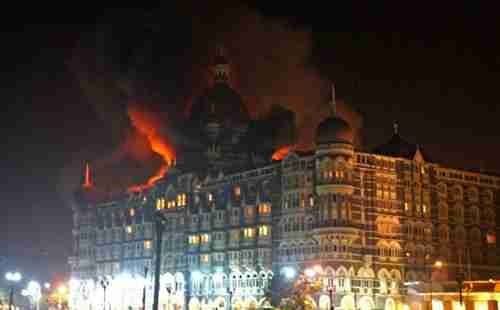 |
Two weeks after Pakistan suffered a horrific Taliban attack on a Peshawar army school, killing over 130 schoolchildren, Pakistan's court is about to set free the alleged mastermind of the horrific 3-day terror attack on Mumbai in 2008, when many hundreds were killed and injured, the iconic Taj Mahal Palace hotel was burned and gutted, and the crowd in the CST Railway Station was sprayed with bullets.
After some investigation, there was little doubt that the perpetrators were Lashkar-e-Toiba (LeT), a terror group that had originally been constituted in the 1990s by Pakistan's Inter-Services Intelligence agency (ISI) to fight Indian forces in disputed Kashmir regions. India said it had evidence that government agencies of Pakistan were involved in plotting the attack, and threatened to send security forces into Pakistan to arrest LeT members. War was averted between the two countries only after hard intervention by then US Secretary of State Condoleezza Rice.
A conflict was averted when Pakistan promised to prosecute the perpetrators, but although LeT members were arrested, there have never been any prosecutions or trials. Now, a Pakistani court has granted $10,000 bail to Zaki-ur-Rehman Lakhvi, the alleged mastermind of the Mumbai attack, and he may be walking free soon, although he may continue to be held on other charges. There is outrage in India at this development, but there seems to be little concern in Pakistan that a major attack by Pakistan's LeT on Indian targets will pass with impunity.
Following the Peshawar attack, Pakistan's prime minister Nawaz Sharif, said: "We announce that there will be no differentiation between 'good' and 'bad' Taliban, and resolve to continue the war against terrorism till the last terrorist is eliminated." Only a few days later, that promise is now very much in doubt. Express Tribune (Pakistan) and India Times and AFP
For the first time, Cameroon's air force conducted air strikes in support of the army against Boko Haram positions in northern Cameroon, forcing the terrorists to retreat. Though Cameroon has deployed thousands of troops to the Far North, the region is difficult to police because of the rugged terrain. Vast expanses of territory are uninhabited and there are few physical barriers demarcating Cameroon's border with Nigeria. Many on either side speak the same Hausa language and it is often difficult to distinguish locals from foreigners.
The bombings follow an escalation of the fighting in Cameroon. In the past, Nigerian Boko Haram fighters have focused on hit and run raids on individual settlements. But now Boko Haram is seeking to expand the territory its holding in Nigeria by taking territory in Cameroon.
According to Cameroon, about 1000 Boko Haram fighters over the weekend seized parts of several villages, and briefly occupied a military camp.
In addition, the militants kidnapped several girls between the ages 12 and 15 for forced marriages to the group's fighters. In the past year, Boko Haram has stepped up kidnappings of young women in Nigeria to sell them into sexual slavery or force them to marry its fighters. Leadership (Nigeria) and Al-Jazeera and VOA
A story that received worldwide attention in October was that it took just 30 Boko Haram militants to capture the commercial city of Mubi, in northeast Nigeria, without firing a shot.
An investigation has revealed that the city was defended by over 1,000 well-armed Nigerian troops, but that they dropped their arms and ran instead of fighting. The debacle is being blamed on sabotage by sympathetic northern troops and some of their commanders who refused to fight the insurgents.
Just as some people in Pakistan's government are sympathetic to the Taliban and support them, it appears that there are people in Nigeria's government and army that are sympathetic to Boko Haram and support them.
The actions by Cameroon to conduct bombing raids against Boko Haram positions in Cameroon have highlighted the problem. Nigeria has a much larger and more powerful air force, but they've refused to take similar actions against Boko Haram positions in Nigeria. This Day Live (Nigeria)
After Greece's prime minister Antonis Samaras received on Monday what is in effect a vote of no confidence from the nation's parliament, Samaras will call on Tuesday for snap elections on January 25.
Polls indicate that the likely winner will be the radical far left Syriza party, led by Alexis Tspiras. Tspiras is demanding that Greece renege on the commitments it made in order to qualify for a 240 billion euro bailout that has already been paid. This would push Greece's government into bankruptcy, and push bond yields up well into double or even triple digits, making it almost impossible for Greece to borrow money. Tspiras has indicated that it would be fine with him if Greece completely abandons the euro currency, and goes back to its old drachma currency.
Greece's stock market fell 11.3%, before partially recovering and closing down 3.9%. Kathimerini and Reuters
(Comments: For reader comments, questions and discussion, see the 30-Dec-14 World View -- Cameroon's air force bombs Boko Haram positions, forcing retreat thread of the Generational Dynamics forum. Comments may be
posted anonymously.)
(30-Dec-2014)
Permanent Link
Receive daily World View columns by e-mail
Donate to Generational Dynamics via PayPal
ISIS kills almost 2000 in Syria in six months
This morning's key headlines from GenerationalDynamics.com
 |
There's a frequently heard complaint that while the mainstream media frequently report on jihadist attacks, they seem to ignore the attacks on Christians. This criticism was directed at me after this article: "26-Dec-14 World View -- 'Barbaric' ethnic massacre in Assam province shocks Indians". One person wrote (paraphrasing): "John, my point is that you left Christians off your list entirely, while at the same time they are being brutally massacred all around the world. You didn't get it then, perhaps due to your biases. You're not getting it now." Another person wrote, "Admit it. You don't like Christians and you downplay violence against them."
Let me assure you, Dear Reader, that I wouldn't hesitate for a nanosecond to report on a massacre of Christians by jihadists or anyone else. So if that's true, you may ask, then why don't I write about massacres of Christians more often?
Let's look at some numbers. How many Christians have actually been massacred by jihadists? I went to the anti-Muslim "Religion of Peace" web site where they have tables of jihadist attacks, including a table of Christians killed by jihadists. Here are the numbers:
A new report sponsored by the BBC finds that more than 5,000 people worldwide died in November alone -- just one month -- as a result of jihadist violence. This would indicate that about 60,000 people have died from jihadist attacks per year.
If you put all these figures together, you can see that the number of Christians killed by jihadists is minuscule -- less than 2% --- compared to the total number of people killed by jihadists. Quite honestly, I would guess that in any given country in recent years, more Christians have been killed by traffic accidents than by terrorists. Overwhelmingly, the people being killed by jihadists are other Muslims.
So that explains the lack of media coverage of Christians killed by jihadists. If fewer than 2% of the victims are Christian, then you would expect Christians to get not much more than 2% of the coverage.
Once again, Dear Reader, when there is a massacre of Christians (let's hope that it won't happen), then I would not hesitate to report it. But what's really going on is that jihadists are overwhelmingly attacking other Muslims. There's a war going on, and it's not between Christians and Muslims. It's between Muslims and Muslims, and it's going to have a huge effect on all our futures. The Religion Of Peace and BBC
According to figures published by the Syrian Observatory For Human Rights, there have been at least 1878 documented executions by the Islamic State / of Iraq and Syria (IS or ISIS or ISIL) since it became a self-declared "Caliphate" on June 28, 2014.
That figure includes 120 of its own ISIS members, who were executed for trying to return back home.
The dead included 930 members of the Shaitat tribe, an important Sunni Muslim tribe that's been opposing ISIS. This is an example of Sunni Muslims massacring Sunni Muslims.
Hundreds of thousands of civilians have been killed in Syria since 2011, when Syria's genocidal monster Bashar al-Assad began launching heavy weapons and chemical-laden barrel bombs on innocent women and children. Now they've been joined by ISIS in massacring thousands more Sunni civilians.
And by the way, I should also mention Pakistan. Last week's horrific Taliban attack on a Peshawar army school, killing over 130 schoolchildren, shows that Pakistan is at war with itself, with Sunni Muslim terrorists killing Sunni and Shia Muslim civilians almost every day.
Once again, Dear Reader, we are not seeing a war of Muslims against Christians, although some Christians are targeted. What we're seeing is something of historic proportions: A massive and growing war of Muslims against Muslims -- Sunni Muslims against Sunni Muslims, Sunni Muslims against Shia Muslims, and Shia Muslims against Sunni Muslims. The intensity of this war has been growing for several years, and at some point will engulf at least the Mideast and South Asia. Syrian Observatory For Human Rights and AFP and Washington Post
(Comments: For reader comments, questions and discussion, see the 29-Dec-14 World View -- Do news organizations ignore jihadist attacks on Christians? thread of the Generational Dynamics forum. Comments may be
posted anonymously.)
(29-Dec-2014)
Permanent Link
Receive daily World View columns by e-mail
Donate to Generational Dynamics via PayPal
America and North Korea accuse each other of internet hacking
This morning's key headlines from GenerationalDynamics.com
 |
I've been following the genocide in Darfur, the western region of Sudan, since it became worldwide news in 2004, and it's been an interesting case study for Generational Dynamics. The genocide has sometimes been called "Everybody's favorite African war," since George Clooney and other movie stars, and politicians like Susan Rice, Nancy Pelosi and Joe Biden have all made "Stop the genocide" and "Save Darfur" and "Enough is enough" part of a very stylish and progressive do-good campaign.
What I wrote over and over since 2004 is that Darfur was experiencing a generational crisis war, and that the war was a force of nature that could not be stopped until it reached a climax.
Low level violence began in the 1970s between two ethnic groups, one of farmers (the "Africans") and the other of camel herders (the "Arabs"). At that time, disputes over land and water were resolved by the village elders, but by the 2000s, the elders had all disappeared, and the younger generations were more interested in confrontation than mediation. During the 1990s, Sudan's government in Khartoum delegated the responsibility of policing the region to the Arab Janjaweed militia, formed from certain groups of herders. This was an ideal solution to Khartoum, since it meant that the "African" and "Arab" Darfuris would have to solve problems themselves, and Khartoum would stay out of it. During the early 2000s, a series of incidents escalated the violence, until the conflict became a generational crisis war in 2003. (A more detailed history can be found in my 2007 article, "Ban Ki Moon blames Darfur genocide on global warming") At that point, the Janjaweed militias (herders) became extremely violent, with a program of massacres, mass murders, rapes, genocide and scorched earth.
Starting in 2006, the United Nations mounted an expensive, high profile peacekeeping operating, with 20,000 blue-helmeted soldiers on the ground at its peak. The peacekeepers rounded up all the hundreds of thousands of displaced people, and herded them into enormous refugee camps, where they were still exposed to attacks by the Janjaweeds. Since then, the budget for the UN peacekeeping force has been dwindling, as have the number of peacekeeping soldiers, though it still costs $1.4 billion per year.
Now Sudan's government in Khartoum, backed by China, is demanding that the UN shrink the peacekeeping force even more, or even eliminate it completely. This is despite the fact that the massacres and rapes by the Janjaweeds are continuing, with hundreds of thousands of people displaced in 2014 alone, and with more than 2 million people in refugee camps. With the peacekeeping forces out of the way, as Sudan and China demand, then the Janjaweeds will be free to complete their mission of mass slaughter of millions of refugees.
In 2004, I wrote that the Darfur war is a generational crisis war that is a force of nature and can't be stopped any more than a tsunami can be stopped. George Clooney has gone home, and Susan Rice has gone on to other causes. After ten years, the tsunami is finally reaching shore. AP and International Business Times and NY Times
The number of migrants fleeing from Syria, Eritrea and northern Africa continues to surge. Supposedly, the European Union was supposed to be responsible for patrolling the Mediterranean shores for migrants, but in practice that responsibility has continued to fall to Italy's navy. Over the Christmas period, the navy picked up a total of 2,300 people. About 165,000 people have made the crossing in 2014, compared to 60,000 in 2013.
Most migrants leave from Libya, where they are charged several thousand dollars by migrant smugglers to make the trip. The migrants are crammed into poorly maintained vessels, sometimes no more than inflatable dinghies. However, traffickers are increasingly switching to a new tactic: They simply have to get the vessel out into the open water in the Mediterranean Sea, and hope that the migrants will be picked up by Italy's navy or by passing merchant ships which are obliged, under the law of the sea, to respond to distress calls. AFP and VOA
 |
North Korea's National Defense Commission on Friday accused the US of shutting down North Korea's internet access, describing President Barack Obama as "reckless" and "a monkey." Another North Korean internet shutdown was observed hours later. Obama has already several days ago accused North Korea of being responsible for the hacking of Sony Pictures. ( "6-Dec-14 World View -- Sony suffers catastrophic breach, possibly from North Korean hackers")
The situation now is that both America and North Korea have hardened positions, each blaming the other for a fairly substantial cyber attack. It remains to be see whether these mutual accusations will settle down or escalate. BBC
(Comments: For reader comments, questions and discussion, see the 28-Dec-14 World View -- Darfur on verge of return to full-scale civil war thread of the Generational Dynamics forum. Comments may be
posted anonymously.)
(28-Dec-2014)
Permanent Link
Receive daily World View columns by e-mail
Donate to Generational Dynamics via PayPal
China debates banning Christmas celebrations
This morning's key headlines from GenerationalDynamics.com
 |
Citizens, schools and even whole towns in China are attempting to curb Christmas celebrations amid a backlash against what is seen as the increasing influence of Western culture.
At one university where Christmas celebrations were banned, students on Christmas eve instead had to attend screenings of what were described as propaganda films about Confucius. Banners were draped outside the university with slogans that read: "Strive to be outstanding sons and daughters of China, oppose kitsch Western holidays," and "Resist the expansion of Western culture."
Schools in Wenzhou, East China's Zhejiang Province, have been forbidden from holding any Christmas-related events this year. The ban on Christmas events covered all high schools, middle schools, primary schools and kindergartens. Wenzhou has been for years a hub of Christian missionary activities. The city is home for roughly a million Christians, according to previous reports.
The ban on Christmas events came on the heels of a series of conflicts between Zhejiang Christians and authorities this year, as the local government tried to demolish churches and crosses that violated construction standards. A church in Yongjia county, Wenzhou was nearly torn down earlier this year. The authority said the building was not built lawfully and was in violation of construction regulations. The church was eventually saved after a series of negotiations in April.
However, an editorial by Xinhua, China's state-run news mouthpiece, says that there's no need to abolish Christmas:
"The debates over Christmas, however, reveal certain anxieties behind China's cultural ambitions. Some critics associate Christmas with a public obsession for anything Western, while others lament the "shipwreck" of Chinese culture.For Chinese Christmas fans, the logic is simple: Like Valentine's Day, Christmas is just a merry time to shop, party and exchange gifts. Non-Christian Chinese associate Christmas more with the "Old Man of Christmas", Santa Claus, than any Christian theology.
One reason for the growing popularity of Western festivals here, particularly among the young, is that they offer an excuse to be with friends and lovers, while traditional festivals are more family-centered, celebrated with family get-togethers and feasts.
There is no need to pit Western festivals against Chinese: Chinese Christmas revelers will still number among the hundreds of millions who travel home for the Lunar New Year family reunion."
One reason that the Chinese Communist Party does not want to end Christmas celebrations is because Christmas is big business for China, especially through the Alibaba e-commerce web site. For example, China manufactures 60 percent of the world's Christmas decorations. Global Times (Beijing) and International Business Times and Xinhua (Beijing)
For decades, China's military has claimed a defensive "no first strike" policy for nuclear weapons, meaning that they would not use nuclear weapons until after surviving a nuclear strike by an enemy, particularly the United States. However, developments associated with the recent tests of the nuclear-capable WU-14 hypersonic missile suggest that China is now focusing on offensive preemptive nuclear strikes, rather than purely defensive responses.
The WU-14 is a major advance in China's military capability. A conventional intercontinental ballistic missile is shot in an arc higher than the atmosphere, and allowed to fall to the target. American missile defenses are thought to be capable of detecting and intercepting attacks of this kind.
The hypersonic missiles under test work differently. They're still carried up by ballistic missiles, but they're released while still in the atmosphere, and they're allowed to glide almost horizontally to their targets at almost 8,000 miles per hour. Because they travel so fast, they're thought to be able to defeat America's current missile defenses. The systems provide enhanced precision, speed, range, maneuverability and multiple-targeting.
In actual practice, the Chinese would launch simultaneous missile attacks, combining traditional ballistic missile attacks with very high speed hypersonic missiles coming in at low altitudes. "It makes the defense problem orders of magnitude worse for the defender," according to one analyst.
The hypersonic missile is capable of delivering either conventional or nuclear weapons. It's thought that China has between 500-1000 nuclear weapons, stored in a vast network of tunnels. The tunnel network is often called China's "underground great wall." There are some 3,000 miles of tunnels, hundreds of meters underground, deep in mountain areas, difficult to detect from space spy satellites. Details of the tunnels have not been publicized for obvious security reasons, but it is known that they are scattered across China and are not all connected to one another. They are designed to withstand nuclear and conventional attacks. Rail lines and trucks move missiles, related equipment, and personnel within the network. All the activities necessary for launch preparation can be done in the tunnels.
Although China has not announced any change to its no-first-use nuclear policy, there are some signs. China's official defense documents now make no mention of no-first use. China's president Xi Jinping made no mention of no-first-use during a visit to China's Second Artillery Corps to congratulate them on the development of the WU-14. The Second Artillery Corps has developed the WU-14 with both conventional and nuclear capabilities, and the same people worked on both sides. In open discussions of the systems, nuclear no-first-use is rarely if ever mentioned. Instead, the discussions have been on the pre-emptive nature of these systems.
This is not proof that China has abandoned its no-first-use policy. But China has been rapidly building its military for years with a variety of weapons and missile systems that have no other purpose than to preemptively strike American aircraft carriers, American military bases, and American cities, and Generational Dynamics predicts that China is preparing for pre-emptive war with the United States. It stands to reason that the developers of these massive military capabilities would not hesitate to use a nuclear weapon in a pre-emptive strike if they believed that it gave them a significant military advantage. Washington Free Beacon and Lowy Institute (Australia) and Bulletin of Atomic Scientists (Jan, 2012)
(Comments: For reader comments, questions and discussion, see the 27-Dec-14 World View -- China's missile tests may signal end of nuclear no-first-use policy thread of the Generational Dynamics forum. Comments may be
posted anonymously.)
(27-Dec-2014)
Permanent Link
Receive daily World View columns by e-mail
Donate to Generational Dynamics via PayPal
Jordan may exchange prisoners with ISIS
This morning's key headlines from GenerationalDynamics.com
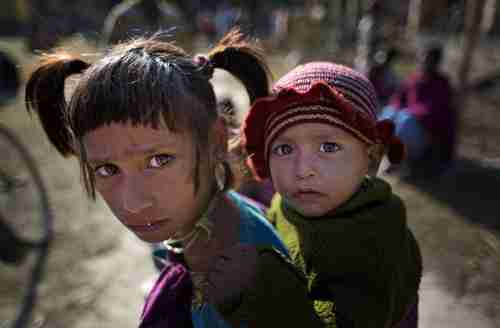 |
Indians have expressed shock over the brutality of the barbaric massacre that took place on Tuesday in Assam province, in India's far northeast. A group of 80 members of the ethnic Bodo tribe massacred 76 men, women and children and caused hundreds in Adivasis villages to flee as their homes were being burned and destroyed. Both groups are a mix of Hindus and Christians, with some Muslims.
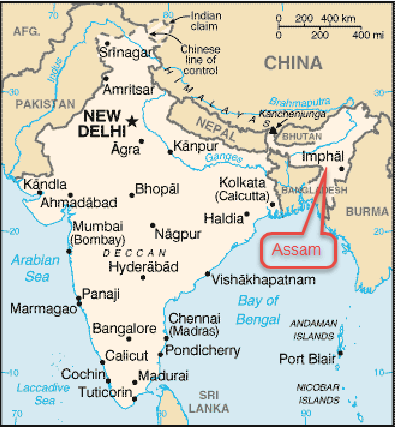 |
The attackers were from a separatist group, the National Democratic Front of Boroland (NDFB), formed in 1994 to demand their own autonomous homeland, Boroland. In particular, the attackers were from a branch of the NDFB known as NDFB-S, after its leader I K Sonbijit. (Note: Boroland is sometimes called Bodoland, apparently because the actual consonant in the original language is somewhere between an 'r' and a 'd'.) The Sonbijit faction was formed in 2012 to fight Bangladeshi Muslims. Hundreds were killed, and thousands are still living in relief camps.
There have already been a few revenge attacks by Adivasis on Bodos, and the fear is that the situation may spiral into a full-scale ethnic war. The Bodo terrorists have apparently fled to Bhutan and Burma (Myanmar), and India is requesting cooperation from those governments to arrest the perpetrators.
We've seen this kind of ethnic massacre recently in Burma, where Buddhists have been massacring Muslims, in Syria, where Muslims have been massacring each other, and in Central African Republic, where Christians and Muslims have been massacring each other.
From the point of view of Generational Dynamics, sex and genocidal massacres are both part of the human DNA, and the human race would not have survived without both of them. Times of India and AP and DNA India
American military officials are saying that the Jordanian F-16 warplane that crashed over territory in Syria held by the Islamic State / of Iraq and Syria (IS or ISIS or ISIL) was not shot down. However, the actual cause of the crash, if known, has not been announced. ISIS is known to possess shoulder-launched land to air missiles, and they have had some success shooting down Iraqi helicopters with them. But an F-16 flies too high for these shoulder-launched missiles. It's not known whether ISIS has captured some advanced missiles that Russia supplied to the regime of Syria's president Bashar al-Assad, or whether the F-16 crash was caused by mechanical failure. At any rate, this was the first capture of a pilot participating in the air strikes against ISIS by the American-led coalition.
There are some unconfirmed reports that Jordan is negotiating for a prisoner swap to get the Jordanian pilot returned. The old al-Qaeda in Iraq, which was the predecessor to ISIS, was founded in 2004 by Abu Musab al-Zarqawi, a Jordanian terrorist. Al-Zarqawi was killed in 2006 by an American drone strike, but some of his terrorist underlings were captured and put into Jordanian jails. Several of these underlings may be exchanged for the captured Jordanian pilot. CNN and Jerusalem Post
(Comments: For reader comments, questions and discussion, see the 26-Dec-14 World View -- 'Barbaric' ethnic massacre in Assam province shocks Indians thread of the Generational Dynamics forum. Comments may be
posted anonymously.)
(26-Dec-2014)
Permanent Link
Receive daily World View columns by e-mail
Donate to Generational Dynamics via PayPal
Christmas is subdued in much of the world
This morning's key headlines from GenerationalDynamics.com
 |
Thousands of Christian pilgrims from around the world crowded into the little town of Bethlehem in the West Bank of the Palestinian territories. Manger Square was decked out in white and yellow lights and a carnival atmosphere, at a time when there are a multitude of things to be sad about: the persecution of Christians, the July-August Gaza war between Israel and Hamas, and the war in Syria, which pits one genocidal Barbarian regime, led by president Bashar al-Assad, against another genocidal Barbarian regime, the Islamic State / of Iraq and Syria (IS or ISIS or ISIL), led by Abu Omar al-Baghdadi.
At midnight mass, the Latin Patriarch Fouad Twal said that, "this Holy Land has become a land of conflict." Bethlehem and Jerusalem lie at the intersection of the world's four major monotheistic religions -- Judaism, Western Christianity, Eastern Orthodox Christianity, and Islam. Twal called for Jews, Muslims and Christians in the Holy Land to "live together as equals with mutual respect." AFP and AP
There's almost no sign of Jesus in China, but there are plenty of pictures of Father Christmas, especially in large cities. While Chinese festivities are solemn, serious and spiritual, Christmas is an excuse to party. Young people especially go out to movie theatres, bars or clubs. According to one citizen, "Christmas is just an excuse to go shopping, as there are many big sales at a lot of places. The theme is to have fun."
But it's also big business. The Christmas season allows China's e-commerce giant Alibaba to play "Santa Claus for the whole world." On Black Friday alone, the company set a one-day sales record of $2.65 million, a growth of 65.6% from last Black Friday. The Atlantic and Xinhua
Christmas is embraced even by Muslims in certain parts of Pakistan's society, especially among the wealthy and education. Large festive Christmas markets spring up in the large cities, including Karachi and Islamabad. Even Muslim children write letters to Santa telling them what presents to bring.
However, Christmas this year has been toned down across the country because of last week's horrific attack on a Peshawar army school, in northwest Pakistan, killing over 130 schoolchildren. Instead, Christmas this year is a time to wonder why Pakistanis have let this happen to themselves. "It is us who have failed, not our children," says one mother. "We have to teach our children to say ‘no’ to wrong. Do not hate anybody, love your country. We are all Pakistanis." Dawn (Pakistan) and NBC News
After a year of the self-declared Caliphate of the Islamic State / of Iraq and Syria (IS or ISIS or ISIL), and the systematic purging of Christians in Iraq and Syria, most Iraqi Christmas celebrations are being held in Baghdad or in refugee camps in Kurdistan in the north of Iraq.
ISIS has conducted operations of ethnic and religious cleansing of hundreds of thousands of Christians. "Talk of Christmas and Christian occasions is forbidden under ISIS," according to a researcher. "The group has destroyed, torched and looted all churches, and barred any display of Christian faith. They also forced the hijab and Islamic way of dress on Christian women, and killed several Christian men for refusing to obey their orders." Al Arabiya (Saudi Arabia) and Huffington Post
(Comments: For reader comments, questions and discussion, see the 25-Dec-14 World View -- Christmas pageantry brings a little cheer to Bethlehem thread of the Generational Dynamics forum. Comments may be
posted anonymously.)
(25-Dec-2014)
Permanent Link
Receive daily World View columns by e-mail
Donate to Generational Dynamics via PayPal
France is on high alert after a string of 'isolated' attacks
This morning's key headlines from GenerationalDynamics.com
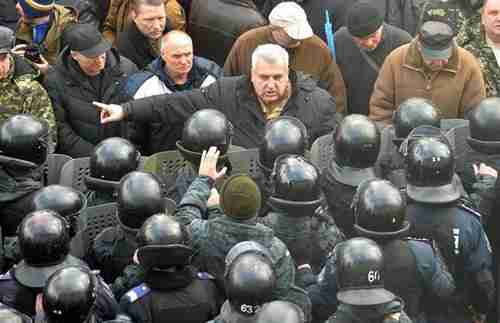 |
Ukraine's parliament on Tuesday voted overwhelmingly to drop the country's non-aligned status as the first step towards Nato membership. According to Ukrainian lawmaker Yuri Bereza:
"If Ukraine had moved to join NATO right after the breakup of the Soviet Union, Russia would have never dared to deploy its troops in Crimea, annex the peninsula and then incite, supply troops and hardware for an armed mutiny in Donbass.Now it is up to us to conduct necessary military and political reforms to join the [North Atlantic] alliance. That will be our iron-clad guarantee against a new Russian aggression."
This point of view is consistent with many Nato officials. According to an essay last June by present and former Nato officials:
"Security on the continent has changed dramatically since NATO agreed in 2008 to admit Albania and Croatia, which joined the following year, the last round of enlargement. Russia subsequently used force against Georgia and then Ukraine, changing borders. Well before the annexation of Crimea and destabilization of eastern Ukraine, Putin had come to regard NATO as an adversary. He has also declared Russia’s intention to use force against perceived oppression of Russian speakers, wherever they are. ...Enlargement contributes to security because it leads to more predictable relations with Russia. Membership has a calming effect on Moscow’s ties with nations as NATO entry greatly increases the costs to Moscow of interfering. Imagine if Estonia or Latvia – two neighbors of Russia with large Russian minorities – were not members of NATO. They could be under as much pressure now as Ukraine. But Moscow has reasons to tread carefully because it knows that an intervention in the Baltics would trigger a collective NATO response."
A Ukraine membership in Nato would create substantial obligations on all sides. Nato would be obligated to come to Ukraine's aid in case of a further Russian invasion, and Ukraine would be obligated to the aid of other Nato members facing military threats. BBC and LA Times and CNN (June 2014)
France's government announced on Tuesday that it would deploy up to 300 extra troops to patrol public areas over the Christmas period. The alarm has been triggered by three bizarre "lone wolf" attacks in three days, combined with charges issued by the Islamic State / of Iraq and Syria (IS or ISIS or ISIL) to jihadists in France to conduct more lone wolf attacks.
On Saturday, a Burundian national who had converted to Islam walked into a police station in Joué-les-Tours, shouted "Allahu Akbar," and stabbed police officers with a knife. On Sunday, a man with a history of mental illness also cried "Allahu Akbar" and used his car to run down pedestrians in several locations in Dijon. then on Monday, a man ploughed his van through a crowded Christmas market in Nantes, before repeatedly stabbing himself with a knife.
The three incidents are unrelated, as far as is known, except that the third one may be a copycat killing. It's feared that there will be further copycat killings. (However, it's not clear to me how a few more policemen are going to stop a crazy driver from driving his car into a crowd.)
In September, ISIS urged Muslims around the world to kill "in any manner" those from countries involved in a coalition fighting against ISIS, singling out the French. Among instructions for killing civilians or military personnel was to run them over with a car or truck. France24 and AFP
(Comments: For reader comments, questions and discussion, see the 24-Dec-14 World View -- Ukraine abandons unaligned status, with intention to join Nato thread of the Generational Dynamics forum. Comments may be
posted anonymously.)
(24-Dec-2014)
Permanent Link
Receive daily World View columns by e-mail
Donate to Generational Dynamics via PayPal
UN Security Council discusses North Korean human rights crimes
This morning's key headlines from GenerationalDynamics.com
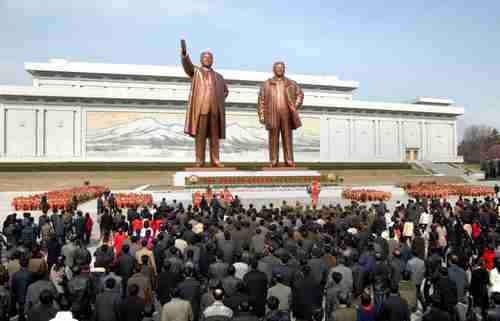 |
North Korea for several hours on Monday suffered massive internet outages affecting the whole country, or at least the few people that the North Korean government permit to access the internet. According to Dyn Research, which monitors North Korea:
"For the past 24 hours North Korea's connectivity to the outside world has been progressively getting degraded to the point now that they are totally offline.There's either a benign explanation - their routers are perhaps having a software glitch; that’s possible. It also seems possible that somebody can be directing some sort of an attack against them and they're having trouble staying online."
Last week, President Barack Obama named North Korea as the perpetrator on the massive attack on Sony Pictures, and promised a "proportional response" at the place and time of our choosing. Many people suspect that this is a US counterattack, although there's no evidence of that, and it's being flatly denied by the administration.
Whether the US is actually responsible or not, if the North Koreans assume that the US is really responsible, then they may plan their own retaliation, making the situation extremely dangerous. Reuters
North Korea issued its usual litany of threats of war and world disaster on Monday, after 11 of the 15 members of the UN Security Council voted to put the issue of North Korean human rights on the Security Council's agenda. The discussion will be based on a report issued by the UN Human Rights Council earlier this year in February. The report documents North Korean crimes against humanity, including torture, abductions, forced prostitution, starvation, and imprisonment for believing in Christianity.
North Korea said that the US was using the human rights issue to overthrow the government. It also calls the dozens of defectors who fled the North and aided the commission of inquiry "human scum."
Among the Security Council nations voting in favor of the resolution were Australia, Great Britain, Jordan, Lithuania, the United States, France and South Korea. Both Russia and China voted against it, calling the resolution "counterproductive." The Security Council will be asked to vote to send North Korea to the International Criminal Court (ICC), but that resolution can be vetoed by any of the five permanent members, and Russia and China will almost certainly do so. There's honor among thieves. AP and Bloomberg and UN Human Rights Council
Outrage is growing in India among minority groups, including Muslims and Christians, because of allegedly forced massed conversions to the Hindu religion. Indeed, the Vishwa Hindu Parishad (VHP) organization claims to have brought 500 people from 100 Christian families "back into the Hindu fold" in large ceremonies. At a ceremony on Saturday, all participants were given a pendant with an image of Lord Ram, along with a Rudraksh [Hindu prayer beads] necklace.
According to one VHP official:
"A yagna [Ritual of Sacred Fire] was performed and participants were given pendants with an image of Lord Ram. They discarded the pendants of another faith. We did not lure any participant."
According to another VHP official:
"Several Hindus had left the religion on account of the inhumane treatment they got. They were taken to Christianity under the influence of foreign money and other temptations. Within Christianity, they have realized they were facing neglect. Hence, many are willing to return to Hinduism. Sometimes, it would become a trend."
Hindu nationalism (Hindutva) has become an extremely contentious issue in India since the election of self-described Hindu nationalist Narendra Modi as prime minister in May. ( "24-Aug-14 World View -- Narendra Modi and rise of Hindutva (Hindu nationalism) in India")
Hindutva activists supporting Modi refer to India as "Hindustan":
"Hindutva is the identity of our nation.Hindustan is a country of Hindus.
The entire world recognizes Indians as Hindus, therefore India is a Hindu state. The cultural identity of all Indians is Hindutva and the present inhabitants of the country are descendants of this great culture."
However, Modi and his political party, the Bharatiya Janata Party (BJP), have disavowed the forced conversions. Times of India and Indian Express and Times of India
(Comments: For reader comments, questions and discussion, see the 23-Dec-14 World View -- Furor in India over Muslim/Christian conversions to Hindu thread of the Generational Dynamics forum. Comments may be
posted anonymously.)
(23-Dec-2014)
Permanent Link
Receive daily World View columns by e-mail
Donate to Generational Dynamics via PayPal
Reader comments say that Vietnam can defend against China
This morning's key headlines from GenerationalDynamics.com
 |
The mythical Sisyphus was condemned to perform hard labor by pushing a heavy rock to the top of a hill, watching it roll downhill, and push it again, continuing to eternity. The participants in the cursed Mideast "peace process" are all like Sisyphus, in that they keep doing the same things over and over, and start all over again after each failure. And as I've written many times starting in May, 2003, the "peace process" will fail with mathematical certainty, and the Sisyphean negotiations will finally end only with a major new war between Jews and Arabs, re-fighting the 1948 war that followed the partitioning of Palestine and the creation of the state of Israel.
In the latest chapter, Jordan, which is currently a member of the United Nations Security Council, has submitted on behalf of the Palestinian Authority a resolution formulated by France that specifies:
Several countries, including Egypt, Saudi Arabia, and United Arab Emirates, all support the resolution.
But Israel's Prime Minister Benjamin Netanyahu is bitterly opposed to the resolution, saying, "we will not accept attempts to dictate to us unilateral moves on a limited timetable."
And the Popular Front for the Liberation of Palestine (PFLP) also bitterly opposes it, saying that it presents a false view of the conflict as one between equal partners with legitimate rights and interests, it provides no punishment for Israel for failing to meet its obligations and, most important, it negates the "Palestinian refugees' inalienable right to return" to the homes of their ancestors in Israel.
At first, Palestinian Authority president Mahmoud Abbas demanded a vote in the Security Council and, assuming it doesn't pass, a vote in the General Assembly were passage is all but certain, but non-binding.
However, US Secretary of State John Kerry warned that if the resolution passed prior to Israel's March 17 elections, it would strengthen the hardliners in Israel's government and affect the elections.
And so, a vote on the resolution has been postponed, this time until after March 17. And thus ends the current round of labor. For the next three months, the participants can watch the boulder roll down the hill again, after which they move on to the next Sisyphean round of their task.
Middle East North Africa Financial Network (MenaFn) and AFP and Jerusalem Post and Palestine News Network
Syria is turning into something of a roach motel for would-be jihadists who had hoped to join the fight against Syria's genocidal president Bashar al-Assad: They can check in, but they're discovering that they can't check out.
The Islamic State / of Iraq and Syria (IS or ISIS or ISIL) has reportedly created a military police force to penalize those who do not report for duty. Hundreds of foreign fighters have been arrested and held prisoner by ISIS, while several dozens have been executed. They've become disenchanted with the grueling fight for various reasons. Some who escaped complained that they were fighting against other rebel groups in Syria rather than against the al-Assad regime. One said, "We aren’t able to speak the truth, and we are forced to do useless things." Another said, "[If] you turn against ISIS, they will kill you." International Business Times
Whenever I express my belief that Vietnam's military is no match for China's, I always get reader comments disagreeing, and my latest such analysis did the same. ( "20-Dec-14 World View -- Philippines and Vietnam launch military and legal buildup to confront China")
Many recalled how the Vietnamese defeated America:
"I remember they said the same thing about Vietnam, back in the sixties. The flags on the ships bringing supplies into Haiphong Harbor will be different this time."
Another pointed to Vietnam's long history with China:
"Vietnam is no match for China?Well, tell that to the 5,000 year history of Vietnam, and Vietnam is still Vietnam standing tall today. Certainly, China didn't learn any lesson from the last deadly anti-China riot in Vietnam. Did China shamefully pick up over 10,000 Chinese losers in Vietnam back to mainland China?
Vietnam - a country like no other, has a great history of resisting and defeating the world's great powers. Well, bring it on because the Vietnamese are ready."
Indeed, the explosive Tay-Son rebellion of the late 1770s is the most celebrated military event in Vietnamese history, when the Vietnamese troops repelled a much larger Chinese army in a brilliant battle that united the north and south for the first time. (See "18-May-14 World View -- A generational history of Vietnam")
Another reader, Emily Han, laid out an entire Vietnamese military strategy:
"Of course, if the Chinese compare numbers and incite continued Han-based nationalism so to feel good of thumping these 2 regional challengers then, yes the Philippines and Vietnam would be no match. However, given the world-wide attention and background of South China Sea conflict, Chinese aggressions are limited to at the most, "a justifiable return of foreign occupied assets" and even that will be near impossible to pull off without chain reactions:* Australia, Japan and India will not watch and in fact are awaiting for such act to populate South China Sea with their warships, lands-based military counter-measures (India) and East China Sea's naval maneuvers (Japan), starting with a Chinese ship-lanes closure.
* Malaysia, Indonesia and Singapore will step out of their faked "neutral" interested parties as they can't cover under "salami slicing" and "cabbage peeling". Minimally, they will shut down Malacca Strait as part of the economic blockade.
* To avoid the triggering of US-Philippines treaty, Chinese will target Vietnamese 29 positions with missiles launchers from warships and follow up with amphibious assault vehicles and without air forces. Strategically, Vietnam's asymmetric warfare has sufficient sustainable counter-measures for several months: every position is a self-defense line against individual landing and 9 positions have a 50-kilometers radius of coordinated defense. Within 1 hour of notification, squadrons of Su-30's and Mig's will directly engage en-route Chinese ships while awaiting arrivals of 3 Kilo submarines, 4 Gepard frigates and 24 Molniya high-speed (40 mph), shallow water (500 tons), missiles carriers (16 Kh-35) to conduct hit-and-hide tactics.
* While Chinese navy must build its offense with replenishment waves, Vietnamese goal is simply 1:1 exchange of ships, delaying landing, disrupting re-supplies and retreats (3 days to nearest Hainan base vs.1/2 day or less to Vietnamese shore)
* When Vietnam destroys or damages more than 2 dozens of Chinese warships (regardless of their own losses), the invasion will be called off and the fight will end. China, however may select to save-face by launching ballistic missiles against Vietnam's mainland targets to cause civilian casualties and claim victories - like they did in the failed 1979 cross-borders. Such move will be ill-advised as it will then, invite global interventions beyond South China Sea theater."
(Comments: For reader comments, questions and discussion, see the 22-Dec-14 World View -- Israel-Palestine struggle moves to the United Nations thread of the Generational Dynamics forum. Comments may be
posted anonymously.)
(22-Dec-2014)
Permanent Link
Receive daily World View columns by e-mail
Donate to Generational Dynamics via PayPal
For the first time, US, Afghanistan and Pakistan will cooperate against Taliban
This morning's key headlines from GenerationalDynamics.com
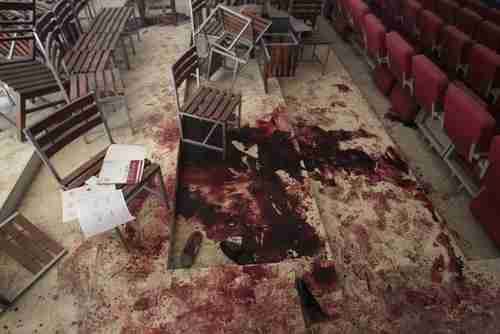 |
After Tuesday's horrific attack on a Peshawar army school, in northwest Pakistan, killing over 130 schoolchildren, Pakistan is essentially declaring war on the Taliban.
The Taliban are not viewed monolithically in Pakistan, as they are in the West. Pakistan's army and the public generally approve of the Afghan Taliban, which attack American and Nato-allied targets in Afghanistan, including Afghanistan's government. And they also generally approve of the Punjabi Taliban, which attack India-linked targets, usually in Kashmir. That's why the first remarks by Pakistan's prime minister Nawaz Sharif, following the massacre, referred only to "terrorist" perpetrators, not to the Taliban.
By Wednesday, Pakistanis were beginning to refer to the attack as "Pakistan's 9/11," and were calling for a full-scale attack on the Taliban. According to Sharif:
"We announce that there will be no differentiation between 'good' and 'bad' Taliban, and resolve to continue the war against terrorism till the last terrorist is eliminated.We have decided that all parliamentary and political leaders will form a national consensus to defeat terrorism. We have decided to draft an action plan against terrorists and act upon it immediately."
He added that "the entire region (of South Asia) should be cleaned of terrorism," and indicated that the army will conduct a massive counter-terrorism operation in the tribal area along the border with Afghanistan.
He also announced an ended to the moratorium on the death sentence. The moratorium had been adopted in 2012 in the hope of a negotiated peace with the Taliban. Pakistan has one of the largest death row populations in the world, with more than 8,000 prisoners awaiting hanging.
Pakistan hanged two convicted militants Friday in the country's first executions in years, while warplanes and ground forces pounded insurgent hideouts in a northwest region bordering Afghanistan. So far, 150-200 militants have been killed in the counter-terror operation announced on Wednesday.
However, the United Nations human rights office issued a statement on Friday asking Pakistan to refrain from hangings, saying that they would not stop terrorism and might even feed a "cycle of revenge."
The Taliban have announced that the reason that they attacked army schoolchildren was in revenge for previous army attacks on Taliban hideouts, which their own wives and children. They promised more attacks on schools, and they also promised revenge for the two hangings.
According to Pakistan's foreign minister, "This has shaken the entire Pakistani society to the core, and in many ways it’s a threshold in our strategy for countering terrorism." India Times and Asian Age and The Nation (Pakistan)
For the first time, Pakistan has agreed to cooperate with Afghan, US and coalition forces in Afghanistan in a joint operation against the Taliban on both sides of the border.
One of the peculiarities of most of the last year or two has been that the Pakistani Taliban has been headquartered in Afghanistan, while the Afghan Taliban has been headquartered in Pakistan. This was convenient for both terror groups, because each side could conduct massacres and terror attacks and then flee across the border to the other side, thus escaping the security forces pursuing them.
Part of the new agreement still forbids "hot pursuit" of fleeing Taliban militants across the border in either direction, as that would breach Pakistan's or Afghanistan's sovereignty. However, the intention is that both the Pak and Afghan armies would cooperate in an anti-Taliban operation, so in theory the Taliban would not be able to escape by crossing the border. ("In theory, theory and practice are the same. In practice, they are not." -- Albert Einstein.)
The agreement also provides additional open Pakistani approval of American drone strikes targeting Taliban officials in the tribal area. A drone strike on Saturday ago killed five militants in North Waziristan.
However, in a sign that the era of cooperation may not last, former prime minister Pervez Musharraf rose from political death long enough to blame Afghanistan and India for ordering the attack on the Peshawar school. Daily Times (Pakistan) and The National (UAE) and Dawn (Pakistan)
(Comments: For reader comments, questions and discussion, see the 21-Dec-14 World View -- After 'Pakistan's 9/11', war is declared on the Taliban thread of the Generational Dynamics forum. Comments may be
posted anonymously.)
(21-Dec-2014)
Permanent Link
Receive daily World View columns by e-mail
Donate to Generational Dynamics via PayPal
China's Achilles' Heel -- the law of the sea
This morning's key headlines from GenerationalDynamics.com
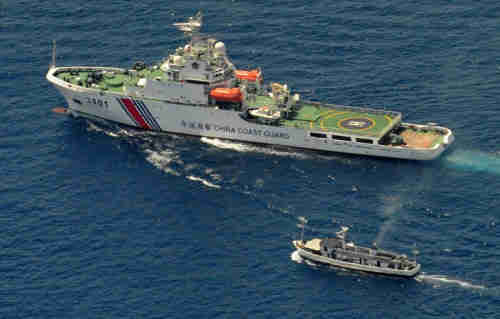 |
With China taking aggressive military actions to annex Philippine and Vietnamese territories in the South China Sea, both of these countries are building up the military capabilities, though nothing that they plan would have more than a small token resistance when facing the massive Chinese military -- until the United States got involved.
The Philippines aims to buy two frigates, two helicopters, and three gunboats for deployment in the South China Sea. South Korea, Spain, France, Italy and Indonesia are bidding on the contracts to supply the weapons.
India is planning to sell to Vietnam several warships -- four patrol boats at first, with seven more later. The sale of these warships has strategic implications for India as well as Vietnam, since India has oil drilling blocks off the coast of Vietnam. New Delhi TV and Reuters
China continues a massive military buildup in the South China Sea, even going so far as to build an artificial island to use for its air force. But on the legal front, China continues to hide behind bluster.
Outside of China, there are few international law experts who believe that China's South Sea China claims, or their notorious "nine-dash-line" doctrine, have any basis in modern international law, specifically the United Nations Convention on the Law of the Sea (UNCLOS). China has been nothing but evasive in response to arbitration procedures in front of the UN Arbitral Panel in the Hague, initiated by the Philippines in 2013 and later joined by Vietnam and supported by the United States. China has refused to recognize any form of arbitration, and last week missed an important deadline in submitting a statement of defense to the panel. No one seriously believes international law will affect China's vast military operation in the South China Sea, but for the time being, the law of the sea is an embarrassment to China. Straits Times (Singapore) and National Interest and VOA
According to an analysis by China's military, the countries of the South China Sea are no match militarily for China, but among them, Vietnam is the strongest, followed by Malaysia and the Philippines.
(Comments: For reader comments, questions and discussion, see the 20-Dec-14 World View -- Philippines and Vietnam launch military and legal buildup to confront China thread of the Generational Dynamics forum. Comments may be
posted anonymously.)
(20-Dec-2014)
Permanent Link
Receive daily World View columns by e-mail
Donate to Generational Dynamics via PayPal
Stock market continues parabolic climb with high volatility
This morning's key headlines from GenerationalDynamics.com
 |
The explosion of piracy off the coast of Somalia, which reached a peak between 2008-10, has resulted in a new, unexpected terror threat. The widespread privacy gave rise to a number of "Private Maritime Security Companies" (PMSCs) that a shipper can hire to provide protection for his ships from pirates.
To perform their service, PMSCs need access to large stores of weapons -- arms, ammunition, body armor, night-vision goggles, and other military equipment. Storing this equipment on land has several problems -- national governments don't like having it there, and the PMSCs constantly have to return to home port to get the equipment.
This has given rise to an explosion of PMSCs with floating armories. These are fishing vessels, tugs, patrol boats and other vessels that have been converted by private companies into floating weapons stores. Sometimes the weapons are made available to third parties for a fee, according to Mark Gray, a director of the British company MNG Maritime:
"It's not the Hilton. As well as storing their weapons, we provide hotel services for security guards who are between jobs. We have bunk beds in cabins, the kind of accommodation they were used to during their military careers. Plus two chefs, a gym on deck and the ever essential WiFi."
It's believed that there are currently 31 floating armories at the present time. Many are in the Red Sea and Persian Gulf, but they might be in international waters anywhere.
There's nothing illegal about them, but they're unregulated, and the vessels that were converted have special security features. Pirates or terrorist groups could seize the weapons, hijack the weapons, or blow them up. A recent statement by the government of India says that it stood "exposed and seriously threatened due to the presence of largely unregulated floating armories with large amounts of undeclared weapons and ammunition." BBC and Oxford Research Group and Full Report (PDF)
 |
As I've written several times recently, the extreme volatility of the stock market is very dangerous, because it indicates that the stock market is being used as a gambling parlor completely unrelated to the company stock shares underlying the market. As we reported ten days ago, the Bank of International Settlements has taken the same view. ( "8-Dec-14 World View -- Bank of International Settlements warns of 'fragile' and 'sensitive' markets")
The drunken euphoria that I heard from analysts today, after the parabolic 421 point surge in the Dow Jones Industrial Average, is a sign of just how dangerous the situation. They don't seem to realize that if the Dow can go up 421 points in one day, then it can just as easily go down 421 points in one day. And with the S&P 500 price/earnings ratio at around the astronomically high 19, well above the historical level of 14, it's only a matter of time before the stock market bubble bursts.
And that's exactly the kind of situation that triggers a panic. These swings are getting wider and wider, just as they did prior to the 1929 crash.
The stock market fell 90% following the 1929 panic, but that didn't happen all in one day. It fell 13% on Black Monday, and then another 12% the next day, but then it gained back 17% on the next two days, so by the end of the week, people were wondering whether it would recover completely. But it kept relentlessly falling, and only bottomed out in the summer of 1932, despite repeated interventions by the Fed, and repeated claims by President Herbert Hoover that "Prosperity is just around the corner."
It shouldn't be called the "Crash of 1929," since the stock stock market didn't really crash in 1929. It should be called the "Panic of 1929" since, after all this time, the day that America remembers is the day of the panic, October 28, 1929. That's how it will happen again. These wild swings will keep increasing, until one day these computerized trading computers ("algos," as they're now called) will take over and produce some sort of "flash crash," and a lot of people will lose a lot of money. That will be the panic that everyone remembers. Then the stock market will partially recover, and people will cross their fingers, but the worst will be yet to come. Detroit News / AP
(Comments: For reader comments, questions and discussion, see the 19-Dec-14 World View -- Floating weapons armories present new terrorist threats thread of the Generational Dynamics forum. Comments may be
posted anonymously.)
(19-Dec-2014)
Permanent Link
Receive daily World View columns by e-mail
Donate to Generational Dynamics via PayPal
US officials say that North Korea is responsible for Sony hack
This morning's key headlines from GenerationalDynamics.com
 |
As I wrote two weeks ago, Sony Pictures suffered a serious hacker attack that's so widespread and destructive that Sony Pictures may not survive. ( "6-Dec-14 World View -- Sony suffers catastrophic breach, possibly from North Korean hackers")
US officials are now saying on background that US intelligence and the FBI have pulled out all the stops to track down the hackers, and they've pieced together the evidence that North Korea ordered the attack, although the individual or group behind the attack were not in North Korea. Analysts have been speculating what the U.S. can do in retaliation.
However, I haven't yet heard mentioned by these analysts what is possibly a more significant point. Sony Pictures may be an American corporation, but it's a subsidiary of a Japanese corporation, Sony Inc. It will not be missed by the people of Japan that North Korea has launched a major attack on a Japanese company, and their retaliation may be a lot more serious. ABC News and AP
On Wednesday, US president Barack Obama and Cuba's president Raul Castro simultaneously announced the restoration of diplomatic relations, for the first time since the Cuban Revolution of 1960 and the Bay of Pigs invasion of 1961. Although politicians are crowing about this and taking credit, it has nothing to do with politicians, but with generational changes in Cuba itself.
This wasn't even the most important change in Cuba. The major change occurred in 2010, when Cuba announced the end of its Communist economy. (See "16-Sep-10 News -- Cuba's seismic shift has global implications") Wednesday's restoration of relations was just the next step in a process that Cuba is still undergoing.
From the point of view of Generational Dynamics, the 2010 announcement was an "Awakening climax," which means that a generational conflict has been settled. The announcement occurred 50 years after the end of Cuba's last generational crisis war, the Cuban Revolution.
All countries follow a similar pattern following the end of a generational crisis war:
For many countries (not Cuba), the last crisis war was World War II, which ended in 1945. Here are some examples of Awakening climaxes following WW II:
Here are some additional examples of Awakening climaxes that illustrate different possibilities:
Really, none of this should be surprising. Fidel Castro ruled for decades by demanding that the Cuban people suffer because of the evil United States. Now Fidel and his brother Raul are in their 80s, and they're simply too old and tired to continue to drive the anti-US fervor, especially because the younger Cubans couldn't care less about the Revolution. And so, Raul agreed to renewing diplomatic relations with the US.
In many ways, Iran is similar to Cuba. Iran's last generational crisis war was the 1979 Great Islamic Revolution, followed by the Iran/Iraq war that ended in 1988. Ayatollah Seyed Ali Khamenei has been trying to maintain revolutionary fervor by citing threats from the evil United States, just like Cuba. If Iran follows the usual pattern for an Awakening climax, then the hardline Iranian regime will collapse 40-50 years later, or within 2008-2018, which would be within the next four years. [Correction: Sorry, but apparently I can't add. This computation is all wrong. 1988+40 = 2028, not 2008. So the time range should be 2028-2038.](Paragraph modified. 18-Dec)
Havana Times and Miami Herald/AP
(Comments: For reader comments, questions and discussion, see the 18-Dec-14 World View -- Cuba's shift is similar to E. Germany, Hungary, Poland, others thread of the Generational Dynamics forum. Comments may be
posted anonymously.)
(18-Dec-2014)
Permanent Link
Receive daily World View columns by e-mail
Donate to Generational Dynamics via PayPal
Russia's crisis deepens as ruble falls another 11%
This morning's key headlines from GenerationalDynamics.com
 |
For each Monday in the past nine weeks, supporters of the explicitly anti-Islam far right Pegida movement have been protesting in cities like Dresden and Düsseldorf. (The phrase "far right" has different meanings in Europe and America.) The demonstrations have been growing in size from a few dozen to start to the 10,000 who demonstrated in Dresden. Germany's government ignored them at first, but the rapid growth of the demonstrations is forcing it to deal with them. Germany's justice minister Heiko Maas said that the protests were "an embarrassment for Germany" and that the country was experiencing a new "level of escalation of agitation against immigrants and refugees."
Pegida is an acronym for "Patriotische Europaeer Gegen die Islamisierung des Abendlandes," which translates to "Patriotic Europeans Against the Islamification of the West." Much of the discontent comes from the fact that Germany has accepted a record number of refugees this year, especially from Syria, and has also witnessed the rise of Salafist movements in German cities with heavy populations of immigrants.
Many of the complaints are about the economy. One elderly man shouted: "I'm a pensioner. I only get a small pension but I have to pay for all these people (asylum seekers). No-one asked me!" However, a woman said, "I am not right wing, I'm not a Nazi. I am just worried for my country, for my granddaughter." Deutsche Welle and BBC and Getty and Pegida facebook page
Terrorists from Tehrik-e-Taliban (TTP, Pakistan Taliban) attacked an army school in Peshawar in northwest Pakistan on Tuesday, killing 141 people, 132 of them schoolchildren, most of them children of soldiers. The attack, which is being described as the worst in years, is being described as revenge for the army's operations against the TTP in Pakistan's tribal area.
During the last few years, the Taliban have splintered into three branches -- the Afghanistan Taliban, targeting US and Nato forces, the Pakistan Taliban, and the Punjabi Taliban, attacking Indian targets. According to analyst reports I've heard, the army has good relations the first and third of these, but has lost control of the Pakistani Taliban.
Many Pakistani people believe that the Taliban are good people, defending their religion, and some even believe that the terrorist attacks are being perpetrated by Iran or the U.S. to discredit the Taliban. Tuesday's attack is thought to be so horrific that it will wash away these attitudes and change minds once and for all. Others point to the bombing of the Marriott Hotel in Islamabad in 2008 that took place just a couple of blocks from the government buildings. That was also a horrific bombing, and it was thought that this attack would change mind permanently, but instead, old attitudes took hold as soon as the initial shock wore off.
Prime minister Nawaz Sharif ran his election campaign with a promise to end TTP attacks by negotiating with the TTP. As we've described many times, these negotiations always were a farce, and were treated with contempt by the TTP. Tuesday's attack should end those attempts once and for all though, although it has been noted that when Sharif condemned Tuesday's attack, he referred only to "terrorists," and not to the Taliban.
Pakistan's major opposition politician is Imran Khan, the former cricket superstar turned anti-American politician. He's been even more supportive of the Taliban, calling for an end to American drone strikes against the Taliban, and calling for the resignation of Nawaz Sharif for allowing the drone strikes.
At the very least, this attack has infuriated the army, who are now promising blood revenge against the perpetrators. Daily Times (Pakistan) and Dawn (Pakistan)
One of the characteristics of a generational Crisis era is the enormous state of denial about many things. Just one illustration of this in the US was the real estate bubble of the mid 2000s decade. Even though I wrote repeatedly about this bubble, starting in 2004, mainstream economists were ridiculously clueless about this, and didn't even begin to talk about the bubble until around 2009, when the real estate crisis was in full flower.
Pakistan's population have clearly been in denial about the danger of the Taliban, despite major terrorist attacks every few days. Some of the attacks have targeted Sufi or Shia Muslims, but most of them have been political, attacking the government or the army by massacring civilians. Tuesday's senseless attack on hundreds of schoolchildren in Peshawar has transformed the denial to shock.
The terrorist attack in Sydney on Monday and Tuesday has had a similar effect on the people of Australia. Australia is a peaceful, open, generous, multi-cultured and inclusive country with strict gun control laws, so Australia's sense of denial took the form of believing that a terror attack would not occur there.
Now Australians are waking up to the fact that dozens of young Australian men have gone to Syria to become jihadists.
The biggest political battle will probably be over gun control. After a 1996 gun massacre, strict gun control laws were imposed, and over a million guns were destroyed in two buybacks since then. Now it's being revealed that the number of guns is back to pre-1996 levels, thanks mainly to gun smuggling operations.
When a country's population moves from denial to shock during a generational Crisis era, then results can be very dangerous, because nationalist forces may be triggered that leads to further shocks, and then to a war. India Times and Daily Telegraph (Sydney) and Sydney Morning Herald
Russia's desperate move yesterday, raising interest rates to 17%, seems to have backfired. The value of the ruble plunged another 11% against the dollar on Tuesday. It's now fallen 20% this week, and fallen more than 50% since the beginning of the year.
It may be that the currency crisis is now being driven by sheer panic, as Russia has several hundred billion dollars saved up in reserves. According to one analyst I heard, Russia could get revenge against the west by bailing out Russian government debts denominated in dollars, but let the corporate debts denominated in dollars simply default. Since most of the holders of Russian dollar-denominated debt are European banks and American investors, Russia could make the currency crisis the West's problem. Reuters
(Comments: For reader comments, questions and discussion, see the 17-Dec-14 World View -- Pakistan Taliban crosses a red line with mass slaughter of army children thread of the Generational Dynamics forum. Comments may be
posted anonymously.)
(17-Dec-2014)
Permanent Link
Receive daily World View columns by e-mail
Donate to Generational Dynamics via PayPal
China: 300 Chinese citizens join ISIS in Iraq and Syria
This morning's key headlines from GenerationalDynamics.com
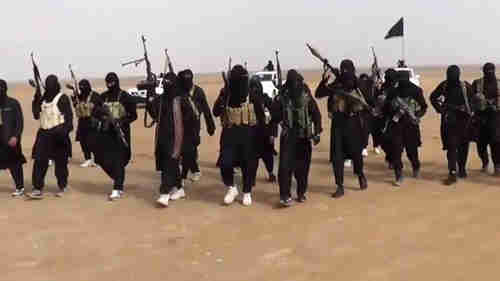 |
As we've reported in the past, young men from Asia are flocking to Syria and Iraq to pledge allegiance to the Islamic State / of Iraq and Syria (IS or ISIS or ISIL). ( "6-Oct-14 World View -- ISIS influence spreads in Asia, as Pakistan Taliban pledges support") Young jihadists throughout Asia, including China, Pakistan, India, Indonesia and Australia, have been drawn by the youthful ISIS leader Abu Omar al-Baghdadi to Syria to join the jihad.
The horrific terrorist attack in Sydney on Sunday and Monday have reminded Australian authorities that some 60 young men from Australia have gone to Syria to join ISIS.
China rarely releases similar figures about Chinese citizens, but did so on Monday, when state media reported that some 300 Chinese people are fighting alongside ISIS in Iraq and Syria. According to the report, these are Uighurs who have joined the East Turkestan Islamic Movement (ETIM), and traveled through Turkey to Syria, where they join the Turkistan Islamic Party (TIP). Chinese media blame "ambiguous policies" by Turkey's government that allow easy access to Turkey through southeastern Turkey's Sanliurfa Province, and then to join ISIS:
"The fact that these extremists can easily enter Turkey and later travel to Syria and Iraq to join IS is a direct consequence of the Turkish government's ambiguous policies."
Turkey's embassy in Beijing called the claims "ridiculous," saying that they only issue passports to Turkish citizens. They blamed the governments of China and other Asian countries:
"The illegal issuance of passports and visas and customs loopholes in some Southeast Asian countries have allowed extremists to travel to Turkey and then go on to join the jihadists. If there weren't so many illegal passports and visas available, there would not be so many members of ETIM in Syria and Iraq."
Reuters and Global Times (Beijing)
A desperate Russian central bank raised interest rates to 17% from 10.5% early Tuesday morning to halt the collapse of the ruble currency. On Monday, the ruble fell 10% in one day against the dollar, for a total of 49% fall this year, resulting in rampant inflation.
Prices of West Texas Intermediate oil took another plunge on Monday to less than $56 per barrel. It was just a few months ago that it was priced at over $100 per barrel.
Russia's economy appears to be spiraling out of control, in the same way that Greece's economy did a couple of years ago. The reasons for Russia's crisis are:
Russia is rushing at breakneck speed to complete a road connecting Dagestan, its province in the North Caucasus, across the Caucasus mountain ridge to Georgia. The road construction is raising alarm in Georgia, as it will allow Russia to invade Georgia rapidly. Russia invaded Georgia in 2008, and occupied two Georgian provinces, Abkhazia and South Ossetia. The road would also establish a land corridor with Armenia, Russia’s ally in the South Caucasus, and cut off the Caspian and the Central Asian region, which is rich in energy resources, from international markets. The highway is expected to be completed by March 2015. Jamestown
(Comments: For reader comments, questions and discussion, see the 16-Dec-14 World View -- Desperate Russia raises interest rates to 17%, as ruble and oil prices collapse thread of the Generational Dynamics forum. Comments may be
posted anonymously.)
(16-Dec-2014)
Permanent Link
Receive daily World View columns by e-mail
Donate to Generational Dynamics via PayPal
Oil production to increase despite, or because of, crashing prices
This morning's key headlines from GenerationalDynamics.com
 |
On September 26, a group of 43 students in a rural teachers' college in Ayotzinapa, Guerrero, in southern Mexico all disappeared, while traveling to the town of Iguala for an anti-government demonstration. At first it was believed that criminals from drug cartels had abducted and killed the students. But later it turned out that José Luis Abarca, the former mayor of Iguala, working hand in hand with the police and the drug traffickers, ordered the lynchings. The 43 students were believed to be burned and dumped, though only the remains of one have been found. Abarca was later arrested by federal officers and charged with murder.
These atrocities led to violent mass protests in Mexico City last month. They are inflaming the fault lines of the Mexican Revolution of the 1910s. Mexico's last crisis war was the Mexican Revolution, running from 1910-1922, so Mexico is deep into a generational Crisis era, and overdue for a new crisis war, from the point of view of Generational Dynamics.
Mexico is like other Latin American countries in that the major fault lines are between the indigenous peoples ("Amerindians") and the indigenous descendants of French and Spanish invaders. The indigenous peoples in Mexico are the Mayans in the south and the Aztecs and Comancheros in the north. The French and Spanish descendants generally live in the center, around Mexico City. During the Mexican Revolution of the 1910s, Pancho Villa (from the north) was the leader, along with Emiliano Zapata, of the indigenous rebel insurgency groups in the south.
Ayotzinapa is in a region populated mostly by indigenous Mayan descendants. The students were called "normalistas" because they went to a "normal" college, one of those that were set up in the 1920s, following the Mexican Revolution, to help the poor indigenous people.
José Luis Abarca was born nearby in Arcelia, Guerrero. He started out poor but got into the gold business and, as a member of the Democratic Revolution Party (PRD), became mayor of Iguala in June 2012, despite having no political experience. He and his wife María de los Ángeles had ruled as "the Imperial Couple." Three of María's brothers were drug traffickers, but had been killed or captured.
The atrocities and massive corruption are pushing all the buttons of the indigenous activists. From the point of view of Generational Dynamics, Mexico is headed for a new war, refighting the Mexican Revolution of the 1910s along the fault line separating the people of European ancestry versus the indigenous peoples. This war may spread into southwestern United States, as there are Aztec descendants in the Aztlán movement who claim that the southwest really belongs to them, and was their ancestral homeland. Reuters and Vice News and Yucatan Times
Oil prices have been plunging due to increased supply from US shale production (fracking), and due to falling demand caused by a slowing world economy. The oil importing countries (Indonesia, India, Taiwan, South Korea, Japan) are benefiting enormously from the plunge in oil prices, while it's a disaster for several oil exporting countries -- Venezuela, Russia, Iran, Iraq, Nigeria. Saudi Arabia has announced it will try to increase oil production, presumably in the hope of putting the US fracking industry out of business.
An analysis by the US Energy Information Administration (EIA) that may shed some light on what's going on. Even though the price of oil is plummeting, US fracking production is going to continue increasing, though perhaps slightly less rapidly than has been previously predicted.
 |
The graph on the left shows that drilling permits have been holding steady, while the number of rigs has fallen slightly. The graph on the right shows that oil production continues to increase, despite the fall in oil prices.
The existing wells are backed by hedge funds and junk bonds that are now in distress because of the fall in prices. As a result, production in the existing wells will actually be increased as much as physically possible, to generate revenue at low oil prices to meet margin calls for these junk bonds.
It occurs to me that the Saudis may be in a similar situation. They may also have shaky investments backing up their oil wells, and so they too would have to keep production as high as possible to make their own margin calls.
This is a good illustration of how deflation feeds on itself, and how some deflation causes more deflation, almost as if were caused by a deflationary attitude. By the law of supply and demand, falling prices normally should cause production to decrease. But the current situation we're in, a highly leverage debt bubble, is an anomalous situation. Falling oil prices are causing production to increase, not because of the oil market, but because of the debt market, resulting in a deflationary spiral. Businesses desperately increase production and sales in the hope of making up for lost earnings, in order to meet their debt margin calls, but the increased supply simply causes prices to fall even faster, resulting in more deflation.
This is a dangerous situation because, as the price of oil continues to fall, one or more of these funds may go bankrupt, and that may cause a chain reaction of multiple bankruptcies. US Energy Information Administration (EIA) and Investment Watch/Wolf Richter
(Comments: For reader comments, questions and discussion, see the 15-Dec-14 World View -- Lynchings of 43 students revive the Mexican Revolution fault lines thread of the Generational Dynamics forum. Comments may be
posted anonymously.)
(15-Dec-2014)
Permanent Link
Receive daily World View columns by e-mail
Donate to Generational Dynamics via PayPal
Pragmatic attitudes towards Israel and Iran
This morning's key headlines from GenerationalDynamics.com
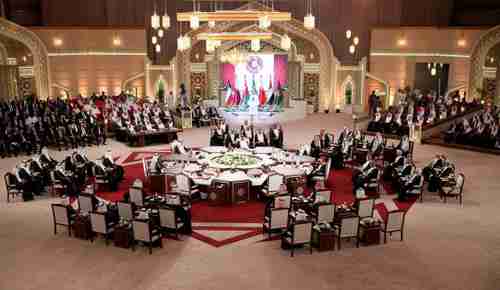 |
The Gulf Cooperation Council (Bahrain, Kuwait, Oman, Qatar, Saudi Arabia and the United Arab Emirates) has succeeded in getting through its summit meeting last week, apparently in relative harmony. (See "21-Nov-14 World View -- Gulf nations paper over their differences for GCC Summit in December")
It's being called a "historic turning point" for the GCC, with potentially far-reaching consequences, because the GCC members have stopped quibbling with each other, and have unified against their common enemies.
As I've written several times in the last few months, the Gaza war has brought about a major Mideast realignment, splitting the GCC members apart. Egypt was the catalyst for this split, at two points. First, when Egypt's army ousted democratically elected Mohammed Morsi and his Muslim Brotherhood government, and replaced him with former army general Abdel al-Fattah al-Sisi, who proceeded with a very bloody crackdown on the Muslim Brotherhood, Muslim Brotherhood supporters Turkey and Qatar turned vehemently against al-Sisi, while Saudi Arabia supported him.
Second, when the Gaza war between Israel and Hamas began this summer, al-Sisi supported Israel and the Palestinian Authority, and turned against Hamas, an offshoot of the Muslim Brotherhood. In addition, Iran supported Hamas against Israel. This created a de facto realignment of the Mideast, with Israel plus Egypt plus Saudi Arabia plus the Palestinian Authority in alliance versus Hamas plus Qatar plus Turkey plus Iran.
The reasons being given for this newfound friendly Arab consanguinity is that a unified GCC stance is necessary "to stop ... attempts led by neighboring countries to intervene in Arab affairs." The two countries referenced are:
According to the final communiqué issued by the summit:
The communiqué also indicates unanimous opposition to the al-Qaeda linked terrorists in Syria and Iraq:
"The Supreme Council welcomed the UN Security Council resolution No 2170 in August in 2014, under Chapter VII, which condemned the spread of serious human rights violations by terrorist groups, including terrorist groups in Iraq and Syria, in particular the Daash and Al Nusra Front, and the sanctions imposed on individuals associated with these groups."
"Daash" is the contemptuous Arabic name for the the Islamic State / of Iraq and Syria (IS or ISIS or ISIL).
So everything's agreeable. Is there any trouble in paradise? The problem is that the communiqué doesn't mention Israel, Hamas, or the Palestinian Authority. The only mention of Gaza is the following:
"The Supreme Council praised the results of the Gaza reconstruction conference, which was held in Cairo in October 2014."
Well that's nice, but are all the GCC nations really going to turn against Hamas, which would make all the member nations de facto allies of Israel and the Palestinian Authority? How long is this pleasantness going to last?
Well, at the very least, we can understand the old Arab saying, "The enemy of my enemy is my friend." Eurasia Review/Arab News and Asharq Al-Awsat (Riyadh) and Saudi-US Relations Information Service
An explanation of the GCC compromise with respect to Iran and Israel was given in a television interview by a Saudi writer, Abdullah Hamidaddin. Does Israel pose a threat to Saudi Arabia? His answer was characterized by extreme pragmatism:
"No. Israel is a troublemaker in the region, but it poses a threat to the Palestinians, not to the Saudis. This has nothing to do with the fact that the Palestinians have rights. Israel is an aggressor on many levels. It is an unjust country. We condemn the violence that we witness day and day out. I am not talking about Israel's injustice towards the Palestinians ...It is imperative to distinguish between the two. The pan-Arabists and the Islamists believe that because Israel occupied an Arab or Muslim country, it must be annihilated as a matter of principle.
I have a different perspective. There is no doubt that Israel plundered [Arab] land, but today the region is divided into countries, one of which is Saudi Arabia. Israel attacked the land of others, not my own land. By no means am I justifying this attack, but with all its evils, it does not pose a threat to the Saudi state or the Saudi citizens."
The interview pointed out that according to the official and declared Saudi position, the Palestinian cause is the cause of all the Arabs.
"There are two reasons for this. First, there is a real problem. Israel's crisis with the Palestinians has generated a regional problem. This crisis has ramifications – although, by the way, these ramifications are highly exaggerated.The second reason is the need to align with the general [Arab] position. King Abdullah's 2003 initiative involved complete normalization, and it was signed by all the Arabs, including Syria. People were convinced that relations with Israel could be normalized, and that we could have coexistence with it, on condition that the problem in the West Bank and Gaza was resolved.
It is in Israel's interest for the problem to remain unresolved. Israel is not a peaceful country. It is a very oppressive country towards its Palestinian neighbors, and it does whatever it can do to prolong the problem, because it benefits from it."
Hamidaddin concluded by saying that the Arabs have wasted resources attacking Israel in the past:
"No, but I want to focus on the issues that affect me. If Israel does not pose a strategic national threat, we should not treat it as if it does. ...[Israel did not create the threats coming from Iraq and Iran.] No, it was us. Since the 1960s, when we turned Israel into a problem, we have wasted our resources. Since the 1950s, the Arabs have spent billions on the conflict with Israel, and have sacrificed hundreds of thousands of lives. The outcome is that we are in decline, whereas Israel is on the rise. If we had treated the Palestinian cause differently right from the start, we would have been today stronger and more capable than Israel, and the Palestinians would have been better off."
So is the GCC crisis over? Another Saudi columnist, Salman Aldossary, suggests that the honeymoon may not last, and that the worst may be yet to come:
"It is premature to think that the crisis has been completely resolved. We should admit that only some of the roots of the problem have been addressed. In addition, some details remain vague. Perhaps the coming months will be sufficient to demonstrate if the good intentions that have been expressed about putting the GCC’s general interests above the narrow ones of its member states are genuine. It should not be overlooked, however, that this acute crisis produced fierce reactions that went beyond those of previous inter-Gulf disputes. This was the case when some sides, affiliated with some parties involved in the dispute, lashed out at certain states or figures. These incidents will definitely not be forgiven, no matter how hard those who were responsible for them try to reach out to their brothers. There is a big difference between disagreeing with someone and registering one’s position through objective criticism on the one hand, and throwing the worst insults at someone on the other. It is true that the Gulf states have overcome their political differences and are quite pragmatic, but they do not forget personal differences and the insults that accompany them.The GCC [has witnessed] a honeymoon period in the run-up to its ... annual summit. ... Who knows, the honeymoon may last throughout the next year. ...
It would be dangerous if the crisis returned and the wound opened once again, God forbid. In this case, the crisis would certainly be more extreme, dangerous, and complex than before, and would produce decisions whose impact no one will be able to comprehend.
May the honeymoon last forever! Nevertheless, wishes need to be accompanied by deeds."
Generational Dynamics predicts that there will be a new war between Arabs and Israelis, refighting the 1948 war between Jews and Arabs that followed the partitioning of Palestine and the creation of the state of Israel. Memri and Asharq Al Awsat (Riyadh)
(Comments: For reader comments, questions and discussion, see the 14-Dec-14 World View -- The GCC honeymoon: Arab countries reach a 'historic' agreement thread of the Generational Dynamics forum. Comments may be
posted anonymously.)
(14-Dec-2014)
Permanent Link
Receive daily World View columns by e-mail
Donate to Generational Dynamics via PayPal
Russia may pause military hostilities in Ukraine for the winter
This morning's key headlines from GenerationalDynamics.com
 |
The Dow Jones Industrial Average fell 315 points on Friday, capping off a brutal 3.8% fall this week on Wall Street. In Europe, Britain's FTSE fell 2.5%, Germany's DAX fell 2.7%, and France's CAC 40 fell 2.8%.
Oil prices continued their free fall, into the below-$60 range. West Texas Intermediate oil fell 3.6% to $57.81 per barrel, down 12.6% for the week.
Also on Friday, the Dept. of Commerce announced that wholesale prices (Producer Price Index) fell 0.2% in November, faster than the 0.1% fall predicted by analysts.
The fall in wholesale prices was led by a fall in overall energy costs. Those prices fell 3.1% on the month, due to a sharp drop in the cost of petroleum products. Energy prices have declined for five straight months. The gasoline index declined 6.3% in November. Home-heating oil costs fell 2.8% and diesel-fuel prices declined 3.5%. From a year earlier, energy prices were down 5.9%, according to the producer measure.
According to Friday's Wall Street Journal, the plunge in stock prices has pushed the S&P 500 Price/Earnings index (stock valuations index) on Friday morning (December 12) down to an astronomically high 18.66, down from the even more astronomically high 19.54 from last Friday (December 7). This is far above the historical average of 14, indicating that the stock market is in a huge bubble that could burst at any time. Generational Dynamics predicts that the P/E ratio will fall to the 5-6 range or lower, which is where it was as recently as 1982, resulting in a Dow Jones Industrial Average of 3000 or lower.
As I've been saying for years, starting in 2003, Generational Dynamics predicts that the economy is in a deflationary spiral. Since mainstream economists have been predicting inflation and hyperinflation, it's pretty clear that mainstream economists don't have the vaguest clue what's going on. Today's reports may give them pause.
One more warning: Hedge funds and other investors now have the entire weekend to think about what they're going to do next, and they may all reach the same decisions -- up or down. The major plunges of the 1929 crash and the 1987 false crash both occurred on Monday. So we may know by midday Monday whether the stock market is going to continue plunging, or whether it's going to recover in the short run. USA Today and Bloomberg and Nasdaq
In the last few days, Russian military attacks on Ukrainian positions in east Ukraine have markedly subsided, and Russia's state media has cooled its rhetoric on the highly nationalistic "Novorossiya" (New Russia) project, referring to all of southern and eastern Ukraine. According to Ukrainian General Staff estimates, Russian troops in Donbas currently total 32,000, including between 6,000 and 10,000 regular Russian Army personnel, the remainder being irregulars recruited locally and from Russia. But the Russian troops have avoided full scale conflict, for fear that the West would impose further sanctions. Instead, the troops transitioned to a kind of positional warfare, but have failed to make any gains against the Ukrainian forces in doing so. In particular, the Ukrainians have blocked Russian probing moves on Mariupol, and the land route from Russia to occupied Crimea.
Part of the calculation is that Russia's economy is heading for disaster. Putin’s policy of state and crony capitalism plus protectionism has eliminated Russia’s economic growth. Since July, Western sanctions have stopped all refinancing of Russian foreign debt, whether private or public. Since June, the price of oil has fallen by 40 percent and with it the ruble exchange rate. These three factors are likely to worsen.
Russia's adventures in Ukraine, while politically popular, have been extremely costly for Russia. Now that Russia has invaded, occupied and annexed Crimea, Moscow is saddled with annexation costs and providing any humanitarian aid that's necessary. In east Ukraine, Russia must provide for an estimated 3.5-4 million people that live on the territory that Russia occupies. Russia is now preparing its tenth humanitarian convoy of hundreds of trucks with food, medicines and other supplies, but these are only a temporary emergency procedure.
There's a debate among economists as to how long Russia can continue in this way. It's true that Russia has hundreds of billions of dollars in foreign reserves that it can tap, but it's also true that Russia's economy may be in a downward spiral. So it now appears that Russia is going to pause for the winter in order to consolidate its gains, and make plans for warmer weather. Jamestown and Peterson Institute for International Economics
Uganda's president Yoweri Museveni said Friday that at the next meeting of the African Union, set for January 30-31, he will propose that all African countries withdraw from the International Criminal Court (ICC)
"I will bring a motion to the next sitting of the African Union to have all African states withdraw from the court, then they [Western nations] can be left alone with their own court. They have used it as a tool to target Africa."
Museveni's remarks came just a few days after an ICC case targeting the president of Kenya collapsed in an embarrassing debacle. Museveni accused the West of using the ICC to destabilize African nations.
Although that ICC does appear to have targeted Africa, that's only because war crimes trials for other countries have taken place in other courts. There are trials targeting the Khmer Rouge for their alleged war crimes in Cambodia's "killing fields" war in the 1970s, but that trial is being held in the "Extraordinary Chambers in the Courts of Cambodia" (ECCC) in Angk Snuol, Cambodia.
There's a trial targeting Ratko Mladic for atrocities committed at the 1995 Srebrenica massacre in the Bosnian war, but that trial is being conducted in the "International Criminal Tribunal for the former Yugoslavia" in The Hague.
There were trials in 1945 for Nazi war criminals, but they were held in special courts in Nuremberg, Germany. Japan's war crimes trials were held in 1946 in the International Military Tribunal for the Far East (IMTFE) in Tokyo.
So, taken as a whole, war crimes courts have certainly not specifically targeted Africa.
From the point of view of Generational Dynamics, these war crime trials are only for political show, and will do nothing to prevent war crimes in future. AFP and Al-Jazeera
(Comments: For reader comments, questions and discussion, see the 13-Dec-14 World View -- Stocks plunge again, as economy spirals into deflation thread of the Generational Dynamics forum. Comments may be
posted anonymously.)
(13-Dec-2014)
Permanent Link
Receive daily World View columns by e-mail
Donate to Generational Dynamics via PayPal
Palestinian Authority decides on actions following death of Ziad Abu Ain
This morning's key headlines from GenerationalDynamics.com
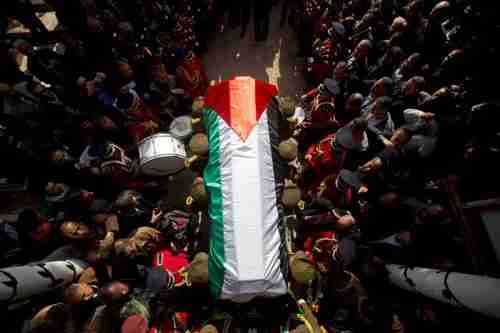 |
The death of a Palestinian Cabinet minister following a clash with Israeli police has caused the Palestinian Authority (PA) to make a series of threats, including a halt to security coordination with Israel.
The Cabinet minister, Ziad Abu Ain, had been participating in a confrontation between Palestinian protesters and Israeli soldiers. At one point, an Israeli grabbed Abu Ain by the throat and pushed him. After the confrontation, Abu Ain spoke to tv cameras, and then collapsed. An autopsy showed that he had a major heart attack. The Israelis are saying that he would have had a heart attack sooner or later anyway. The Palestinians are saying that the heart attack was the direct fault of the Israeli soldiers, who caused Abu Ain to have "anguish and stress." Abu Ain was the PA Cabinet minister in charge of organizing protests against Israeli settlements and the West Bank separation barrier.
The death of Abu Ain has (further) infuriated the Palestinians, leading the PA to threaten to end security cooperation with Israel. If this occurs it will be a major big deal. It would mean that the Palestinians themselves would not take any further responsibility for any kind of crime occurring the West Bank, and that Israel, as the "occupying power," would be responsible for all West Bank security. The cooperation agreement is very unpopular with the Palestinians, because it often means that Palestinians are prevented by other Palestinians from violence and protests against Israeli settlements.
Although the PA is making this threat, it's not thought that PA president Mahmoud Abbas will go through with it. As I've written many times, Abbas was born in 1935, and survived the horrific 1948 war between Jews and Arabs that following the partitioning of Palestine and the creation of the state of Israel. Like most survivors of generational crisis wars, Abbas has literally devoted his life to doing everything possible to prevent that horrific kind of war from occurring again. As regular readers know, Generational Dynamics predicts that he will not succeed in preventing that horrific war, though he may continue to postpone it.
In this case, Abbas is well aware that ending the security cooperation agreement with Israel is a sure-fire way to create a lot more confrontations between Palestinians and Israelis, and may well be all that's needed to trigger the new war between Jews and Arabs that Abbas has devoted his life to trying to prevent. AP and CNN
According to senior Palestinian official Saeb Erekat, in an interview on al-Jazeera, the Palestinian Authority (PA) has tentatively decided to take six actions in response to the death of Ziad Abu Ain (my transcription, sometimes edited for clarity):
The Palestinian Authority will meet on Sunday to decide how to move forward on these actions. Irish Times and Jewish Virtual Library
(Comments: For reader comments, questions and discussion, see the 12-Dec-14 World View -- Palestinians threaten to halt security coordination with Israel thread of the Generational Dynamics forum. Comments may be
posted anonymously.)
(12-Dec-2014)
Permanent Link
Receive daily World View columns by e-mail
Donate to Generational Dynamics via PayPal
Wall Street sell-off deepens as oil prices plummet
This morning's key headlines from GenerationalDynamics.com
Due to circumstances beyond my control, there was no World View column yesterday. My apologies to anyone who was inconvenienced.
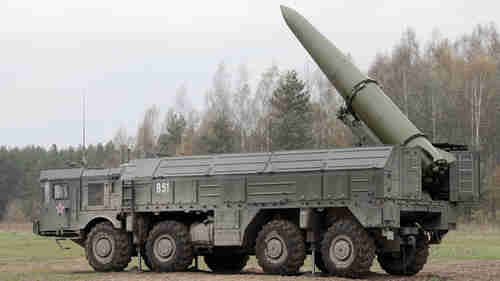 |
Russia is deploying nuclear capable Iskander missiles in Ukraine's Crimea peninsula, which is occupied by Russia in violation of international law, unapproved by the UN Security Council. Iskander systems could be fitted with up to ten different types of warhead, including tactical nuclear warheads, which can be transported to Crimea in a matter of hours.
This is part of a project to build up Russia's existing military infrastructure in occupied Crimea, particularly associated with the basing of its Black Sea Fleet, to extend its level of control in the Black Sea region more broadly. Nato commander General Philip Breedlove has expressed his concern about what he described as Russia’s "militarization of Crimea," which received widespread publicity in Moscow. He also noted the increasing numbers of weapons in Crimea and cruise missiles, which could affect the regional military balance.
Last year, Moscow confirmed the deployment of Iskander missiles in Kaliningrad, on the border with Nato and the Baltic states. Combined with a deployment of the system to occupied Crimea, NATO’s eastern flank is heavily exposed to the capabilities of the Iskander. Jamestown and Russia Today (16-Dec-2013)
UN human rights chief Antonio Guterres is calling many countries "mean-spirited" for making keeping migrants out a higher priority than saving migrants' lives. According to Guterres:
"This is a mistake, and precisely the wrong reaction for an era in which record numbers of people are fleeing wars. Security and immigration management are concerns for any country, but policies must be designed in a way that human lives do not end up becoming collateral damage."
According to the UN, there have been at least a record-breaking 348,000 "boat people" so far this year, migrants who risked traveling over water to go to another country:
Related to the increasing flood of refugees are the unprecedented numbers of countries in crisis. For the first time, the UN has declared five "Level 3" humanitarian crises: West Africa (Ebola), Iraq, South Sudan, Syria, and the Central African Republic. Many crises are centered in the Palestine region, with a population that grew from 600,000 a century ago to 12 million today -- the most rapid population growth in the world.
From the point of view of Generational Dynamics, there are many simultaneous trends -- population growth, increased food prices, increased nationalism, increased recklessness, increased fragility of the global economy -- that are leading to a new world war in the current generational crisis era. And to emphasize the point, the BBC is reporting that 5,000 people worldwide have been killed by jihadist attacks in November alone. Euro News and UN High Commissioner for Refugees and AFP
As I wrote a couple of days ago, the Bank of International Settlements is confirming the view that the wild swings in the stock market are similar to those that occurred just before the 1929 crash, and are extremely dangerous today. ( "8-Dec-14 World View -- Bank of International Settlements warns of 'fragile' and 'sensitive' markets")
Analysts are blaming the three-day sell-off in Wall Street stocks, capped on Wednesday with a fall of 268 points in the Dow Jones Industrial Average, on a dramatic plunge in the price of oil. West Texas Intermediate oil fell to $59 dollars a barrel on Wednesday, before closing at $61.21, and OPEC predicted reduced oil demand next year, suggesting that oil prices will go a lot lower. It's thought that the plunge in oil prices is a proxy for slowing economies in Europe and Asia.
According to one analyst I heard on Wednesday, this is a "global margin call." 15 of the 20 largest sovereign wealth funds get their money from oil, and now they're being forced to sell their assets as their oil-linked investments plummet in value. As with any broad-based margin call, this is causing a chain reaction that's affecting markets around the world.
The S&P 500 Price/Earnings ratio (stock valuation index) is above 19, which is astronomically than the historic average of 14. This indicates that the stock market is in a huge bubble which, like all bubbles, has to implode at some point. From the point of view of Generational Dynamics, this could happen at any time. It remains to be seen whether the current round of volatility settles down. CNBC and Fortune
(Comments: For reader comments, questions and discussion, see the 11-Dec-14 World View -- UN says nations should make saving migrants' lives the highest priority thread of the Generational Dynamics forum. Comments may be
posted anonymously.)
(11-Dec-2014)
Permanent Link
Receive daily World View columns by e-mail
Donate to Generational Dynamics via PayPal
Canada and Britain close their Cairo Egypt embassies over security concerns
This morning's key headlines from GenerationalDynamics.com
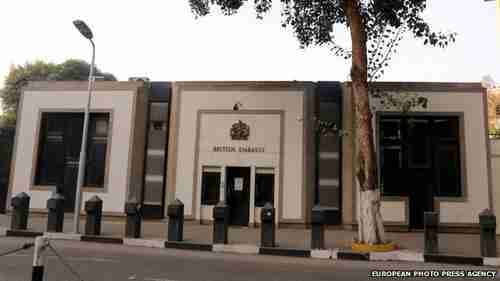 |
Canada on Monday joined Britain in closing its embassy in Cairo Egypt over security concerns raised by the Islamic State / of Iraq and Syria (IS or ISIS or ISIL). According to a statement from Canada's foreign affairs minister:
"As a security precaution, and to ensure the protection of Canadian staff, we have closed our embassy in Cairo for the day. We take the safety of our personnel and our mission overseas very seriously. We are monitoring events closely and taking appropriate security measures. ... We don't comment publicly on security precaution specifics at our missions."
According to the UK government web site, "Public services at the British Embassy in Cairo are currently suspended. The office of the British Consulate-General in Alexandria is operating as normal."
The U.S. issued a travel warning, but the Cairo embassy remains open.
The security concerns are thought to be related to recent terrorist attacks in Egypt, and threats by ISIS. The concerns were heightened by a suspicious yellow powder sent to multiple Western consulates in Istanbul, Turkey.
According to an Australian travel advisory:
"Reports of early December, 2014, indicate that terrorists may be planning attacks against tourist sites, government ministries and embassies in Cairo."
Decision on whether to reopen the embassies are being made on a day by day basis. Globe and Mail (Ottawa) and UK Government
Carrying through on his threat, Palestinian Authority president Mahmoud Abbas joined the International Criminal Court (ICC) with observer status on Monday. In doing so, the PA came one step closer to seeking membership in the ICC in order to bring war crimes accusations against Israel for the Gaza war earlier this year. At present, Palestine has the same observer status as the US, Russia, China, India or any other country that is not a signatory of the Rome Statute.
However, if the ICC takes jurisdiction over crimes committed in the Israel-Palestine conflict, then both sides would have to be held accountable. The Palestinians would have to deal with the following problems:
For those reasons, Abbas may completely avoid making charges related to the Gaza war and, instead, accuse Israel of human rights violations in the West Bank. Al Jazeera and Open Democracy
(Comments: For reader comments, questions and discussion, see the 9-Dec-14 World View -- State of Palestine joins the International Criminal Court thread of the Generational Dynamics forum. Comments may be
posted anonymously.)
(9-Dec-2014)
Permanent Link
Receive daily World View columns by e-mail
Donate to Generational Dynamics via PayPal
Israel's warplanes strike Syria, in areas near Damascus
This morning's key headlines from GenerationalDynamics.com
 |
Syria said on Sunday that Israel's warplanes had bombed areas near Damascus international airport and in the town of Dimas, near the border with Lebanon. Syrian state media said that messages had been sent to the United Nations demanding sanctions against Israel:
"The messages read that Israel has committed a heinous crime against the sovereignty of Syria as Israeli warplanes attacked two safe areas in al-Dimas and near Damascus International Airport in Damascus Countryside, causing material damage in a number of institutions there.The Ministry stressed that the attack is in the framework of extending help and support to the armed terrorist groups in Syria, especially after the series of achievements made by the Syrian army in Deir Ezzor, Aleppo, Daraa and other areas. ...
The attack reflects the Israeli explicit involvement in supporting the armed terrorist groups in Syria, on top of which Jabhat al-Nusra, along with well-known regional and western countries."
Israel and Syria have been in a state of war since 1948. Israel refused comment on the accusations.
It's thought that Israel was striking advanced weaponry or chemical weapons held by the regime of Syria's president Bashar al-Assad and in transit to Hezbollah in Lebanon for use in attacking Israel. However, a Lebanese TV correspondent reported that Israel struck 10 crucial intelligence-linked locations in Syria that belong to Iran. SANA (Syria) and Jerusalem Post and Al Arabiya (Saudi Arabia)
Schools in Egypt's North Sinai region along the border with the Gaza Strip are reopening after ten days closure due to Egypt's counter-insurgency operations in the area.
Egypt's army is attempting to eliminate "once and for all" the threat from Hamas terrorists from Gaza, following a massive October 24 terrorist attack with a car bomb that killed 33 Egyptian troops. Egypt's president Abdel al-Fattah al-Sisi labeled the attack an existential threat to Egypt, and ordered that a buffer zone be built along the border with Gaza with the objective of eliminating the smuggling tunnels under the wall that separates Gaza from Sinai.
The original plan was that the buffer zone would be 500 meters (1/2 km) wide and 13.5 km along the border. However, several days ago Egypt announced that it would double the width of the buffer zone to 1 km. According to the state news agency:
"A decision was taken to increase the buffer zone along the border in Rafah to one kilometer. The decision ... came after the discovery of underground tunnels with a total length of 800 to 1,000 meters."
Egypt has been demolishing homes in Sinai along the Gaza border in order to make room for the buffer zone. Egypt originally announced that 802 homes were to be demolished and 1,156 families to be relocated. With the doubling of the width of the buffer zone, it's assume that 1600 homes will be demolished and 2300 families displaced and relocated.
There has been little international condemnation or interest in Egypt's plan to demolish 1600 homes. However, there has been a great deal of international condemnation when Israeli forces demolished the home of Abdelrahman Shaludi, a terrorist who had purposely plowed his car into pedestrians on October 22, killing two people. Daily News Egypt and Daily News Egypt (18-Nov)
Last week, on one of days when the Dow Jones Industrial Average reached a fresh all-time high, I heard one of the male anchor on CNBC say something like: "The Dow Jones has reached an all-time high 48 times this year. That's the highest number since 1929." The female anchor said, "What are you saying????" and quickly changed the subject.
In fact, the near-parabolic spike in stock prices is only one of the ways that Wall Street is signaling danger. According to Friday's Wall Street Journal, the S&P 500 Price/Earnings index (stock valuations) on Friday (December 5) has shot up to 19.54. This is far above the historical average of 14, indicating that the stock market is in a huge bubble that could burst at any time.
On October 16, I warned that wild stock market swings, which are similar to the wild swings that occurred in October 1929, were particularly dangerous, because the next wild swing could be sharply downward by hundreds of points.
Now the Bank of International Settlements (BIS) is confirming this view in its quarterly report:
"These abrupt market movements (in October) were even more pronounced than similar developments in August, when a sudden correction in global financial markets was quickly succeeded by renewed buoyant market conditions.This suggests that more than a quantum of fragility underlies the current elevated mood in financial markets. Global equity markets plummeted in early August and mid-October. Mid-October's extreme intra-day price movements underscore how sensitive markets have become to even small surprises."
The BIS pointed out that the US dollar has been strengthening significantly in recent weeks against the euro, the yen, and other emerging market currencies. This is happening because the Federal Reserve is cutting back on quantitative easing ("printing money"), at the same time that the European Central Bank (ECB) and the Bank of Japan (BOJ) have been significantly increasing their quantitative easing programs. On Friday, there was an unemployment report of a larger-than-expected rise in U.S. jobs in November, and this sent the dollar to multi-year highs against the yen and euro.
Many companies in emerging economies have been going increasingly into debt, just as American companies did in the mid-2000s, leading to the financial crisis. However, many of the emerging market company debts are denominated in dollars, and so a significant strengthening of the dollar means, in effect, that the amount owed is growing substantially, relative to the country's own currency. This could force these businesses into bankruptcy, creating a chain reaction of further bankruptcies. Also, it could force many hedge funds and businesses to liquidate their assets, such as stocks and bonds, in order to pay their debts, causing a chain reaction of asset sales, causing a stock market plunge.
According to one currency analyst, Kit Juckes at Sociéte Générale, this could have an effect as early as Monday morning:
"It's the warning that the rising dollar could bring more (emerging markets) trouble in its wake - as it did in the 1990s - that is going to challenge FX [foreign exchange] markets tomorrow [Monday] morning while we're all thinking about what the U.S. non-farm payroll data mean for Fed rate hike timing."
Reuters and AFP and Bank of International Settlements (BIS)
(Comments: For reader comments, questions and discussion, see the 8-Dec-14 World View -- Bank of International Settlements warns of 'fragile' and 'sensitive' markets thread of the Generational Dynamics forum. Comments may be
posted anonymously.)
(8-Dec-2014)
Permanent Link
Receive daily World View columns by e-mail
Donate to Generational Dynamics via PayPal
Britain will open a new military base in Bahrain
This morning's key headlines from GenerationalDynamics.com
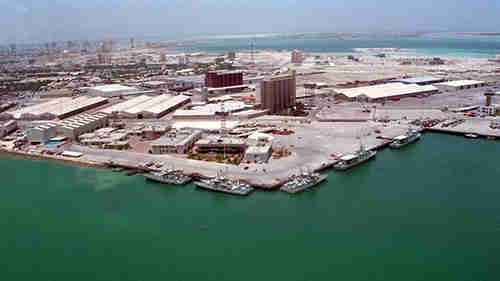 |
Britain and Bahrain announced a deal for Britain to open a new military base in Bahrain. The U.S. Navy's Fifth Fleet is also based in Bahrain, and Britain has been sharing some of its facilities. This new agreement will permit Britain to substantially expand its presence in the Mideast. Britain closed all is major bases east of the Suez canal following major defense spending cuts in 1971, so this agreement marks the first permanent base in the Mideast since then. According to Britain's defense secretary:
"This new base is a permanent expansion of the Royal Navy's footprint and will enable Britain to send more and larger ships to reinforce stability in the Gulf."
Immediate plans including using the new facilities in the fight against ISIS. The US has been escalating its military presence in Iraq and Afghanistan, and it appears that Britain is doing so as well. Guardian (London) and AFP
Outgoing U.S. Secretary of Defense Chuck Hagel announced on Saturday that the administration is increasing by 1,000 the number of soldiers that the US will keep in Afghanistan next year. Hagel noted that there has been a particularly violent surge of Taliban attacks in Kabul recently. "The recent wave of Taliban attacks has made it clear that the international community must not waver in its support for a stable, secure and prosperous Afghanistan," he said.
President Obama had promised to have all US troops out of Iraq and Afghanistan by the end of 2014. He brought in anti-war politician Hagel as Secretary of Defense in order to complete the withdrawal, but circumstances, especially the Islamic State / of Iraq and Syria (IS or ISIS or ISIL), have forced him to order American troops to re-enter Iraq, and then to continually increase the US presence. ( "8-Nov-14 World View -- Obama sharply escalates U.S. involvement in Iraq war") It now appears that increased Taliban violence is beginning to force a similar escalation in Afghanistan. Reuters and CNN
(Comments: For reader comments, questions and discussion, see the 7-Dec-14 World View -- Obama orders 1000 more troops for Afghanistan thread of the Generational Dynamics forum. Comments may be
posted anonymously.)
(7-Dec-2014)
Permanent Link
Receive daily World View columns by e-mail
Donate to Generational Dynamics via PayPal
Mahmoud Abbas blames Gaza war on lies by Hamas and Muslim Brotherhood
This morning's key headlines from GenerationalDynamics.com
 |
You may have read some news reports that hackers broke into Sony Pictures's computer network, downloaded some movies and made them available for free online. According to the reports, North Korean may have perpetrated the hacks in retaliation for the pending release of a move, "The Interview," which is a comedy that mocks North Korea's easily mockable president Kim Jong-un. North Korea has previously reacted to news about the film by threatening war.
It turns out that the hacker breach was far more serious than the release of a couple of movies, and is so widespread and destructive that Sony may not survive. The hackers downloaded a dozen terabytes of data, including substantial corporate data and intellectual property. The data included employee salaries, performance reviews, criminal background checks, passwords, RSA tokens, global network maps, email accounts, and 47,000 Social Security numbers. The hackers are releasing much of that data online. The data includes everything that a hacker would need to compromise Sony all over again, in the manner of their choosing.
As bad as that is, it goes far beyond even that to wholesale large-scale system destruction. The hackers released malware designed to completely erase all data files throughout Sony's entire network, including servers and PCs.
The attack was so vicious and so personal that it may well have been a North Korean attack. However, the hackers had customized the malware with specific knowledge of Sony's internal networks, indicating that the hackers may have had help from an insider, someone like the American traitor Snowden.
Other corporations are looking on the Sony situation with horror, because they know that they could be next. They're appalled at the seeming ease with which the hackers entered the system, the sheer volume of data that was released, and the amount of destruction that was wrought. Any corporation that hasn't been worried about cybersecurity in the past should start worrying now. Dark Reading and Bloomberg and BBC
Palestinian Authority president Mahmoud Abbas on November 30 gave a lengthy interview on his strategy for dealing with Israel, Egypt and Hamas. He repeated many things we've described before -- plans to gain worldwide recognition for the State of Palestine, plans to bring war crime charges against Israel, opposition to the plan to declare Israel a "Jewish state," as that would degrade positions of the Arab Israelis.
Abbas also laid out how the Gaza war began. As we've written in the past, three Israeli teenagers were abducted on June 10, and their dead bodies were found on June 30. This triggered a spiral of violence that led to the Gaza war, and further violence in Jerusalem since then. Israel accused Hamas of the murders of the teens, and Hamas denied it. Abbas says that it was this lie by Hamas that led to the war:
"We agreed [with Hamas] that we would establish the [unity government between Hamas and Abbas's Fatah], but that it would not include a single member of the Hamas movement. This government was sworn in on June 2,.[2014], and exactly ten days later, on June 12, they kidnapped the three settlers [near] Hebron. I tried to avoid creating a crisis. I spoke with [Hamas political bureau head] Khaled Mash'al and asked him whether Hamas had anything to do with the kidnapping of the settlers, and he said: We have nothing to do with it. I wanted him to confirm it again, and he swore by Allah that they had nothing to do with it. I told him: I believe you. That was in Doha.Then the war in Gaza broke out, and I visited Qatar and Turkey to consult [with them] about the Egyptian initiative. I had a meeting with the Emir of Qatar, and I asked him [to hold a meeting] attended by the Hamas leadership and by members of the movement who were in Qatar. Before this meeting [was held], Hamas member Salah Al-'Arouri officially declared from Istanbul that it was Hamas that had kidnapped the three settlers and killed them, in order to promote Hamas's attempt to mobilize the Palestinians in the West Bank and Jerusalem. Then I asked Mash'al again about those involved in the affair, and he said that Al-'Arouri had spoken for himself, not for Hamas.
I want to say here that no one lies more than them [Hamas] and the Muslim Brotherhood (MB). I am not against Islam, but I am against the MB. I am a good Muslim – I fast, I pray, and I read the Koran – while they are a bunch of liars...
Because of Hamas's lie, this regrettable Gaza war broke out. I phoned the Egyptian president and asked him to submit a proposal to stop the war. I clarified that [such] an initiative would save the Palestinian people, and that it was the entire Palestinian people that was asking him to do this, not Hamas. [I explained this because] I sensed from his words that he wanted nothing whatsoever to do with Hamas. President Al-Sisi met my request, and the Egyptian initiative was proposed. They [had to] propose it for 51 days, because of Hamas's obstinacy, and during this time the land [Gaza] was completely destroyed. On the last day [of the war], Hamas members begged me to declare a ceasefire with no reservations or conditions, after many had already been killed and wounded and Gaza was in ruins.
During the 50-day war, everyone spoke out against me, first of all Fatah. I told them that I am not willing to destroy the West Bank and Ramallah. Hamas, for example, killed three [Israelis], and it wanted an intifada, and I did not respond... At the end of the war, my men told me: You were right. Had we acted like them [i.e., like Hamas], the [entire] land would have been ruined..."
I wondered why Hamas did not accept the reconciliation from the outset, instead of [allowing] the destruction that was caused in the [Gaza] Strip. The same thing happened when they blew up the homes of the Fatah leaders in Gaza recently [on November 7], but claimed that they were not involved in this and that they were investigating the incident. They are liars."
Abbas simply can't understand why Hamas leaders seem to want a war that would destroy Gaza when he does not, but this is exactly the kind of thing that Generational Dynamics explains. Abbas was born in 1935, and lived through the horrors of the 1948 war between Jews and Arabs that followed the partitioning of Palestine and the creation of the state of Israel. He says, "Had we acted like [Hamas], the entire land would have been ruined." How did he know that? Because the entire land was ruined by the 1948 war.
The Hamas leaders are young, and have no personal memory of the horrors of the 1948 war. They look at Iran's 1979 Great Islamic Revolution, where a popular uprising overwhelmed the existing government, and installed a hardline Shia government. Using that as a model, they believe that a war with Israel would bring about a popular uprising that would destroy the state of Israel, and put a hardline Sunni government -- governed by Hamas and the Muslim Brotherhood -- in charge of all the Palestinian territories -- that is, the State of Palestine.
Generational Dynamics predicts that a new war between Jews and Arabs will in fact take place, though it may not turn out exactly as the Hamas leaders hope. The state of Israel may or may not survive, but the Hamas government may not survive either. One thing is pretty certain: That Abbas's worst fears will come true, and the entire land will be ruined. And the Hamas leaders, if they survive, will almost certainly be sorry that the war ever started. MEMRI
(Comments: For reader comments, questions and discussion, see the 6-Dec-14 World View -- Sony suffers catastrophic breach, possibly from North Korean hackers thread of the Generational Dynamics forum. Comments may be
posted anonymously.)
(6-Dec-2014)
Permanent Link
Receive daily World View columns by e-mail
Donate to Generational Dynamics via PayPal
AQAP in Yemen threatens to kill journalist not saved by failed US rescue attempt
This morning's key headlines from GenerationalDynamics.com
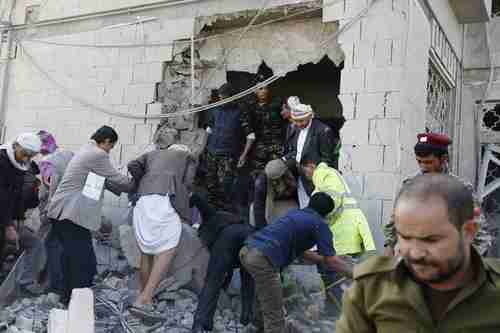 |
A car bomb exploded near the home if Iran's ambassador to Yemen on Wednesday, killing six people and injuring seventeen. Hossein Niknam had only just become Iran's ambassador a few days before, and was apparently the target of the bombing, though he was not at home and was unharmed.
Al Qaeda in the Arabian Peninsula (AQAP) has claimed responsibility for the attack. In addition, their statement boasted that "despite the security precautions put in place by the Yemeni regime forces and the Houthi political committees, the mujahideen managed to park the explosive laden vehicle and detonate it at 9:02 am (local time)."
Sectarian Sunni versus Shia violence has been growing in Yemen ever since the Iran-backed Shia Houthi tribes from northern Yemen invaded the capital city Sanaa in September and took control of the government. On October 9, a suicide bomber struck a Houthi checkpoint, killing 47 people. AQAP are still holding embassy staffer Nour Ahmad Nikbakht who was abducted in July last year. Saba News (Yemen) and The National (UAE) and Long War Journal
AQAP has threatened to kill 33-year-old Luke Somers, an American photojournalist born in Britain, whom AQAP kidnapped in September, 2013 from Sanaa, the capital city of Yemen.
US officials have for the first time public acknowledged a failed attempt to rescue Somers last month. According to the White House:
"As soon as the US government had reliable intelligence and an operational plan, the president authorized the Department of Defense to conduct an operation to recover Mr Somers. Regrettably, Luke was not present."
However, in the assault on a cave, US and local security forces rescued six Yemenis, a Saudi and an Ethiopian, and killed seven Al Qaeda kidnappers.
AQAP commander Nasser Bin Ali Al Ansi issued a video condemning the American "stupidities" -- attempts to rescue abducted hostages, and gave Washington three days to meet al-Qaeda's demands or "otherwise, the American hostage held by us will meet his inevitable fate." The video does not specify the demands, but says that Washington is aware of them. Reuters and AP
(Comments: For reader comments, questions and discussion, see the 5-Dec-14 World View -- AQAP in Yemen bombs Iranian ambassador's house, killing six thread of the Generational Dynamics forum. Comments may be
posted anonymously.)
(5-Dec-2014)
Permanent Link
Receive daily World View columns by e-mail
Donate to Generational Dynamics via PayPal
Iran strongly denies it's targeting ISIS with airstrikes, despite video
This morning's key headlines from GenerationalDynamics.com
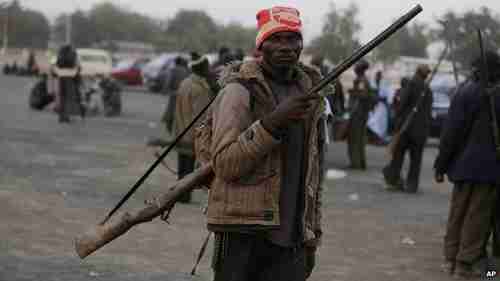 |
The Nigerian terror group Boko Haram continues to abduct schoolgirls and to take control of entire villages in the northeastern state of Adamawa, especially near the border with Cameroon. Nigeria's army continues to appear to be helpless against Boko Haram, and some reports indicate that soldiers have been shedding the uniforms and fleeing when Boko Haram approaches.
Authorities in Adamawa now say they're implementing their own plan. They plan to mobilize some 4,000 vigilantes from the local villages. Bala James Nggilari, the governor of Adamawa, said:
"The vigilantes and hunters are local people, local boys who know the terrain. When you bring a soldier from Bayelsa [in southern Nigeria], for example, who is coming here for the first time he doesn't know the terrain.The people we are fighting are also part of the local community. There is nothing on their forehead that says 'insurgent' but these local hunters are familiar with them, they know them, they have the native intelligence which the regular army may not have."
These vigilantes, in cooperation with the army, have already retaken several towns that Boko Haram has captured.
Boko Haram is afraid of these vigilante groups, according to one resident. The local men know some of the insurgents personally and would be able to identify them to security forces. For Boko Haram to operate freely, "they must be sure they overcome those vigilante groups."
Boko Haram last week attacked Damasak, a town on the Cameroon border, killing dozens of people. There is evidence that this attack was a revenge attack against the town's young men who have been joining anti-Boko Haram vigilante groups. BBC and VOA
There has been video on al-Jazeera and elsewhere of Iranian war planes striking ISIS targets in Iraq, and also of Iranian special forces on the ground in Iraq. American officials have confirmed it. And yet, Iran's foreign ministry has firmly denied any Iran military presence in Iraq against the Islamic State / of Iraq and Syria (IS or ISIS or ISIL).
The situation is embarrassing for both America and Iran. American officials have insisted strenuously that America and Iran are not cooperating or coordinating air strikes or any other military action in Iraq, and that that Iraq government was responsible for an coordination of the two air forces that might be necessary, presumably to make sure, for example, that American and Iranian war planes don't crash into each other. That's because the administration doesn't want to be seen as cooperating in any way with Iran.
It's even worse for the Iranians. The Iranian leadership, starting on top with the delusional Supreme Leader Ayatollah Seyed Ali Khamenei, blames everything on "the Zionist regime" (Israel) and the "minions of Arrogance" (America). To show even the slightest cooperation with either the Zionist regime or the minions of arrogance would undermine the entire purpose of his daily rants. In fact, I suspect that the entire government might collapse if he admitted to cooperating with the Americans.
There's another reason. Iran and Iraq fought a generational crisis war in the 1980s, climaxing in 1988. Iraqi Sunnis do not trust the Shia Iranians in any way, and one of the reasons that many of them have joined ISIS is because they believe that Iraq's Shia government in Baghdad is in league with Iran -- which is undoubtedly true. To admit that Iranian warplanes were bombing targets in Iraq would only further infuriate the Iraqi Sunnis. The bombing is also making Iran's Sunni enemies in Saudi Arabia and Qatar nervous.
Still, more and more commentators are noting the irony of Iran and American working together to oppose ISIS. I wrote ten years ago that American and Iran would be allies in the coming Clash of Civilizations world war, and we're seeing that prediction come closer and closer to confirmation almost every week. With Iran now bombing Sunni targets in Iraq, it would take only one or two miscalculations to turn this into a broader sectarian war between Sunnis and Shias. Mehr News (Tehran) and AP
(Comments: For reader comments, questions and discussion, see the 4-Dec-14 World View -- Nigeria mobilizing thousands of vigilantes to fight Boko Haram thread of the Generational Dynamics forum. Comments may be
posted anonymously.)
(4-Dec-2014)
Permanent Link
Receive daily World View columns by e-mail
Donate to Generational Dynamics via PayPal
Kenya's government in crisis after al-Shabaab kills 36 Christians
This morning's key headlines from GenerationalDynamics.com
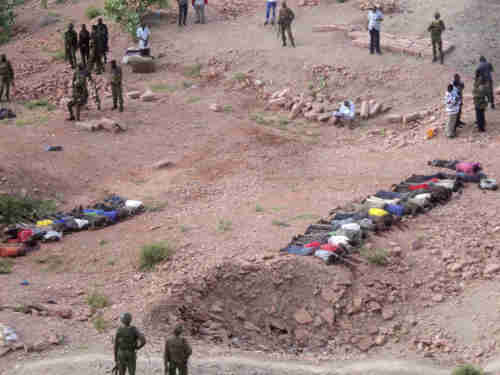 |
On Tuesday, al-Shabaab terrorists killed 36 mainly Christian miners working in a quarry in northern Kenya, near the border with Somalia. The 60 or so workers were asked to recite the Shahada, an Islamic creed declaring oneness with God. Those who couldn't were shot and killed.
This follows a similar incident that occurred on November 22, when Al-Shabaab terrorists forced a bus carrying 60 passengers to stop. They asked the passengers to recite Koranic verses, and those who were unable to do so were lined up and then killed. 28 people were killed, 19 men and 9 women.
Kenya's president Uhuru Kenyatta has been facing growing criticisms ever since al-Shabaab terrorists attacked the Westgate shopping mall in Nairobi last year, killing 67 people. Facing a political crisis, Kenyatta on Tuesday announced a government shakeup, and replaced two of his top security chiefs.
Other Christians working in the same area are in dread for their lives. Many of them have no money and are in debt, so they're unable to leave the area. ("You load 16 tons, and what do you get? Another day older and deeper in debt. Saint Peter don't you call me, cause I can't go - I owe my soul to the company store." - Tennessee Ernie Ford) Standard Media (Kenya) and AP and Bloomberg
Officials in Lebanon's army say that they've arrested the wife and son of Abu Omar al-Baghdadi, the self-describe caliph and leader of the Islamic State / of Iraq and Syria (IS or ISIS or ISIL). The pair were arrested ten days ago as they tried to enter Lebanon from Syria. The arrests were made in conjunction with American and Western intelligence sources. It's believed that authorities waited ten days to announce the capture in order to have time to interrogate the pair and get information that could be used for a surprise attack on ISIS or al-Baghdadi himself. For example, she might know where al-Baghdadi is now, or what routes he uses to travel around.
The name of the captured woman is Saja Hamid al-Dulaimi. It's unclear whether she actually is one of al-Baghdadi's three wives, or whether she's a former wife, or whether she's really married to some other jihadist unrelated to al-Baghdadi. There are also questions about whether the child who was captured was a boy or a girl. And if al-Dulaimi is al-Baghdadi's wife, then why was she coming to Lebanon? Was it to escape from al-Baghdadi, for whatever reason?
Whether al-Dulaimi knows enough to provide useful intelligence is unknown, but her greatest value may be as a bargaining chip to win the release of 26 Lebanese security personnel previously kidnapped by ISIS. Daily Star (Beirut) and Daily Star (Beirut) and CNN and Time
(Comments: For reader comments, questions and discussion, see the 3-Dec-14 World View -- Wife and son of ISIS leader al-Baghdadi captured in Lebanon thread of the Generational Dynamics forum. Comments may be
posted anonymously.)
(3-Dec-2014)
Permanent Link
Receive daily World View columns by e-mail
Donate to Generational Dynamics via PayPal
Syrian refugees increasingly threaten regional stability
This morning's key headlines from GenerationalDynamics.com
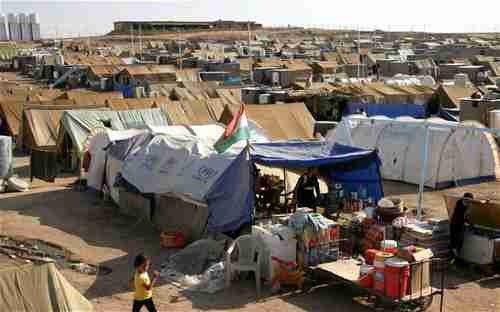 |
Some 1.7 million Syrian refugees, who have depended on the United Nations World Food Program (WFP) to provide food vouchers so that they can eat at least one meal a day, are now going to have to go without that food. The WFP food voucher program has been shut down as of December 1 for lack of funding, just as winter is approaching.
Every month, the UN feeds over four million people inside Syria, and almost two million more now sheltered in other countries. The food voucher program allowed 1.7 million refugees in Jordan, Lebanon, Turkey, Iraq and Egypt to purchase food in local stores.
Many countries have pledged money to the WFP without honoring their pledges. That lack of honor is not true of the United States which has given almost $1 billion to the WFP for its operations with Syrians since the conflict started, including a donation last week of $125 million. But that money covered food vouchers issued in November, and was not enough to stave off the end of food vouchers on December 1.
The food voucher money not only allowed refugees to purchase food, but it also provided cash that traveled through the community to create jobs and business opportunities. The loss of this funding, especially with the cold winter approaching, is going to mean increased instability in a region where instability is growing on a daily basis anyway.
Syria's refugees are currently the world's largest humanitarian disaster, but not the not the only one. Recently, the WFP was forced to cut food rations for the half-million Sudanese and Somalian refugees in Kenyan refugee camp. The Ebola crisis in West Africa is creating food shortages for more than a million people. The growing millions of people in crisis are overwhelming United Nations' aid agencies to the point where they can no longer operate effectively. CS Monitor and LA Times
It's been personally astonishing to me to see the Syrian conflict unfold from peaceful demonstrations into a proxy war threatening the region and the world.
The Islamic State / of Iraq and Syria (IS or ISIS or ISIL) is a creation of Syria's president Bashar al-Assad and his supporters, including Russia's president Vladimir and Iran's Supreme Ayatollah Seyed Ali Khamenei. These are all war criminals because they participated in and supported wholesale genocide against innocent Syria Sunnis. Syria's Shia/Alawite president Bashar al-Assad has flattened entire Sunni villages with Russia's heavy weapons, he's killed children by sending missiles into exam rooms and bedrooms, he's killed dozens with sarin gas, and he's killed countless more with barrel bombs loaded with explosives, metals, and chlorine gas. In addition, he's used electrocution, eye-gouging, strangulation, starvation, and beating on tens of thousands of prisoners on a massive "industrial strength" scale, and does with complete impunity, and in fact with encouragement and support from Russia and Iran.
When I was growing up in the 1950s, it was hard for me to understand how Hitler and Stalin could have gotten away with what they had done, and why they had so many supporters. I remember asking my mother that very question and not getting a satisfactory answer. Now I understand why, as I see the sycophants of al-Assad and Putin defend their horrific actions. And the sycophants have been rewarded. Al-Assad's genocidal actions against innocent protesting Sunnis have encouraged jihadists from around to world to join ISIS and other jihadist organizations. We can now see how stupidity brings about disaster.
When refugees began crossing borders in 2011, they were treated with sympathy and given the aid that they needed. But as the hundreds of refugees have grown into thousands, then tens of thousands and then hundreds of thousands, their welcome has worn thin, and they're straining the resources of the neighboring countries. Syrians are willing to work for low wages, forcing everyone's wages down. Rents are rising because of the refugees, and schools and hospitals are becoming crowded. The refugees complain of discrimination, abuse, and sexual exploitation by landlords and merchants.
And there's no end in sight. Apparently nobody is going to stop al-Assad and his chemical-weapons-laden barrel bombs being dumped on neighborhoods filled with innocent women and children. So there's really no expectation that the refugee crisis will end anytime soon. Al-Assad and Putin will continue with mass murder, and ISIS will continue to become more powerful.
Lebanon has attempted to enforce new measures aimed at limiting the number of Syrians entering the country. These new measures have reduced the influx of refugees, but rights groups have denounced the measures, claiming that they violate international law.
Jordan is a small country, but it's hosting 1.2 million Syria refugees. The Syrians are the third big wave of refugees to enter Jordan since independence in 1946. First came the Palestinians – those who lost their homes when Israel was created in 1948, and a second exodus in the wake of the 1967 war. Iraqis arrived in 1991 and again in 2003. Now the Syrian refugees have done it again.
Like Lebanon, Jordan is closing its border to all but a small number of further Syrian refugees. This is motivated largely by security needs. The refugees are coming from regions of Syria under control of ISIS, and there's a danger that ISIS terrorists will enter Jordan pretending to be refugees. VOA and Guardian (London)
(Comments: For reader comments, questions and discussion, see the 2-Dec-14 World View -- World Food Program terminates aid to 1.7 million Syrian refugees thread of the Generational Dynamics forum. Comments may be
posted anonymously.)
(2-Dec-2014)
Permanent Link
Receive daily World View columns by e-mail
Donate to Generational Dynamics via PayPal
Hong Kong police clash with protesters, worst violence in weeks
This morning's key headlines from GenerationalDynamics.com
 |
Police used batons and pepper spray to beat back pro-democracy protesters trying to surround government headquarters in Hong Kong. Protesters yelled "I want true democracy!" and "Surround the headquarters. Paralyze the government." Protesters wore surgical masks, hard hats and used umbrellas -- which have come to symbolize the pro-democracy movement -- to shield themselves from the pepper spray, and pelted the police with water bottles and other objects. The clashes began on Sunday and continued through the night into Monday. The protests had been simmering down recently, but this was the worst violence in weeks. 40 protesters were arrested.
The renewed violence comes just one day after Taiwan's pro-Beijing governing party (KMT) had a disastrous election loss, giving power to Taiwan's pro-independence opposition party (DPP). ( "30-Nov-14 World View -- Taiwan voters choose independence from China")
Activists say that many people in Hong Kong are excited and inspired by the results of Taiwan's election. According to one, "If Taiwan can create change, so can Hong Kong in the future."
It's thought that China would like to end the Hong Kong protests peacefully, so as not to further encourage the anti-Beijing activists in Taiwan. However, the Hong Kong activists point out that they have no other way to get their demands heard except by occupation. AAP and AFP and Central News Agency (Taiwan)
Saying that "Israel is no longer a peace partner," Palestinian Authority president Mahmoud Abbas said that "the current situation of the Palestinian territories is not sustainable. ... We have no option but to internationalize the issue." He added that in case the statehood bid is thwarted, "we would move towards defining our relations with Israel by halting security coordination and calling for the occupation to assume its responsibilities" under international law as "an occupying power" of the West Bank. The statements were made at an Arab League meeting in Cairo on Saturday.
Abbas laid out a specific timeline for "ending the Israeli occupation," and gaining international recognition of Palestine:
Abbas noted that the parliaments of three separate Western countries (Sweden, the UK, and Spain) have recognized "Palestine," and that France will be voting on the issue.
Abbas referred to proposed legislation by Israel's prime minister Benjamin Netanyahu to declare Israel as a "Jewish state." Abbas said that the proposal was "racist," and that "Palestinians will not recognize Israel as a Jewish State," which would attempt to enshrine Israel's "apartheid regime." Abbas pointed to other Israeli laws that he considers "racist."
Generational Dynamics predicts that there will be a new war between Arabs and Israelis, refighting the 1948 war between Jews and Arabs that following the partitioning of Palestine and the creation of the state of Israel, and that there is no guarantee that Israel will survive that war. WAFA (Gaza) and Israel National News
The summer Gaza war made public some very bitter disagreements between Saudi Arabia and Egypt versus Qatar and Hamas. As we reported two weeks ago, Saudi Arabia mediated a truce to last at least through the summit meeting on December 4. ( "21-Nov-14 World View -- Gulf nations paper over their differences for GCC Summit in December")
At Saturday's Arab League meeting, all the nations were able to continue papering over their differences by agreeing that the biggest issue facing all the Arab states is the "Israeli occupation of Palestine." One of the issues in resolving that conflict is to find a way to provide security in the West Bank without relying on Israeli security forces.
This issue was not discussed at the Arab League meeting, since it would have opened up new bitter disagreements.
Egypt's president Abdel Fattah Al-Sisi had previously stated in an interview that he would be willing "to send military forces to a Palestinian state" in order to reassure Israel and assist police forces. In a TV interview on Saturday, Abbas said that there is no objection to the presence of Egyptian troops on Palestinian territories. "It is welcomed, as Al-Sisi wouldn’t say anything contrary to the interests of the Palestinian people."
However, this agreement leaves completely unresolved the question of Gaza and Hamas. Qatar supports Hamas, while Egypt considers them to be a terrorist group. Hamas would not tolerate Egyptian troops in Gaza. Furthermore, Hamas is tolerating Abbas as president of the Hamas-Fatah unity government only because of political expediency, and Hamas would expect to govern the entire State of Palestine. This means that Egyptian troops would not be tolerated, and there would immediately be a state of war between Israel and Palestine.
Saturday's Arab League meeting was able to maintain cordiality by focusing narrowly on Abbas's plans to force international recognition of a State of Palestine. However, Abbas's plan makes no mention of Gaza and Hamas, and the intrinsic contradiction in any plan to have a fully independent State of Palestine alongside Israel. Daily News Egypt and Gulf News (Dubai)
(Comments: For reader comments, questions and discussion, see the 1-Dec-14 World View -- Arab League agrees on plan to 'end Israeli occupation' of Palestine thread of the Generational Dynamics forum. Comments may be
posted anonymously.)
(1-Dec-2014)
Permanent Link
Receive daily World View columns by e-mail
Donate to Generational Dynamics via PayPal
Web Log Summary - 2016
Web Log Summary - 2015
Web Log Summary - 2014
Web Log Summary - 2013
Web Log Summary - 2012
Web Log Summary - 2011
Web Log Summary - 2010
Web Log Summary - 2009
Web Log Summary - 2008
Web Log Summary - 2007
Web Log Summary - 2006
Web Log Summary - 2005
Web Log Summary - 2004
Web Log - December, 2016
Web Log - November, 2016
Web Log - October, 2016
Web Log - September, 2016
Web Log - August, 2016
Web Log - July, 2016
Web Log - June, 2016
Web Log - May, 2016
Web Log - April, 2016
Web Log - March, 2016
Web Log - February, 2016
Web Log - January, 2016
Web Log - December, 2015
Web Log - November, 2015
Web Log - October, 2015
Web Log - September, 2015
Web Log - August, 2015
Web Log - July, 2015
Web Log - June, 2015
Web Log - May, 2015
Web Log - April, 2015
Web Log - March, 2015
Web Log - February, 2015
Web Log - January, 2015
Web Log - December, 2014
Web Log - November, 2014
Web Log - October, 2014
Web Log - September, 2014
Web Log - August, 2014
Web Log - July, 2014
Web Log - June, 2014
Web Log - May, 2014
Web Log - April, 2014
Web Log - March, 2014
Web Log - February, 2014
Web Log - January, 2014
Web Log - December, 2013
Web Log - November, 2013
Web Log - October, 2013
Web Log - September, 2013
Web Log - August, 2013
Web Log - July, 2013
Web Log - June, 2013
Web Log - May, 2013
Web Log - April, 2013
Web Log - March, 2013
Web Log - February, 2013
Web Log - January, 2013
Web Log - December, 2012
Web Log - November, 2012
Web Log - October, 2012
Web Log - September, 2012
Web Log - August, 2012
Web Log - July, 2012
Web Log - June, 2012
Web Log - May, 2012
Web Log - April, 2012
Web Log - March, 2012
Web Log - February, 2012
Web Log - January, 2012
Web Log - December, 2011
Web Log - November, 2011
Web Log - October, 2011
Web Log - September, 2011
Web Log - August, 2011
Web Log - July, 2011
Web Log - June, 2011
Web Log - May, 2011
Web Log - April, 2011
Web Log - March, 2011
Web Log - February, 2011
Web Log - January, 2011
Web Log - December, 2010
Web Log - November, 2010
Web Log - October, 2010
Web Log - September, 2010
Web Log - August, 2010
Web Log - July, 2010
Web Log - June, 2010
Web Log - May, 2010
Web Log - April, 2010
Web Log - March, 2010
Web Log - February, 2010
Web Log - January, 2010
Web Log - December, 2009
Web Log - November, 2009
Web Log - October, 2009
Web Log - September, 2009
Web Log - August, 2009
Web Log - July, 2009
Web Log - June, 2009
Web Log - May, 2009
Web Log - April, 2009
Web Log - March, 2009
Web Log - February, 2009
Web Log - January, 2009
Web Log - December, 2008
Web Log - November, 2008
Web Log - October, 2008
Web Log - September, 2008
Web Log - August, 2008
Web Log - July, 2008
Web Log - June, 2008
Web Log - May, 2008
Web Log - April, 2008
Web Log - March, 2008
Web Log - February, 2008
Web Log - January, 2008
Web Log - December, 2007
Web Log - November, 2007
Web Log - October, 2007
Web Log - September, 2007
Web Log - August, 2007
Web Log - July, 2007
Web Log - June, 2007
Web Log - May, 2007
Web Log - April, 2007
Web Log - March, 2007
Web Log - February, 2007
Web Log - January, 2007
Web Log - December, 2006
Web Log - November, 2006
Web Log - October, 2006
Web Log - September, 2006
Web Log - August, 2006
Web Log - July, 2006
Web Log - June, 2006
Web Log - May, 2006
Web Log - April, 2006
Web Log - March, 2006
Web Log - February, 2006
Web Log - January, 2006
Web Log - December, 2005
Web Log - November, 2005
Web Log - October, 2005
Web Log - September, 2005
Web Log - August, 2005
Web Log - July, 2005
Web Log - June, 2005
Web Log - May, 2005
Web Log - April, 2005
Web Log - March, 2005
Web Log - February, 2005
Web Log - January, 2005
Web Log - December, 2004
Web Log - November, 2004
Web Log - October, 2004
Web Log - September, 2004
Web Log - August, 2004
Web Log - July, 2004
Web Log - June, 2004